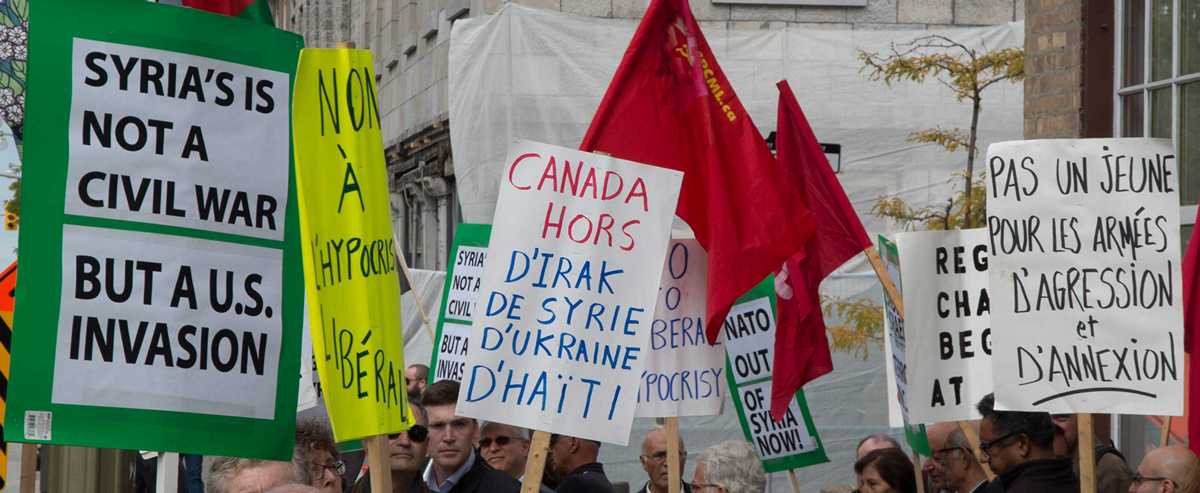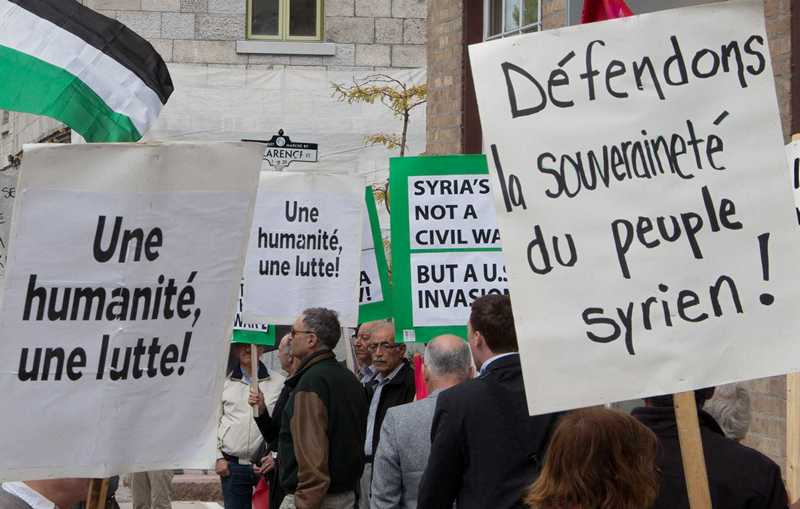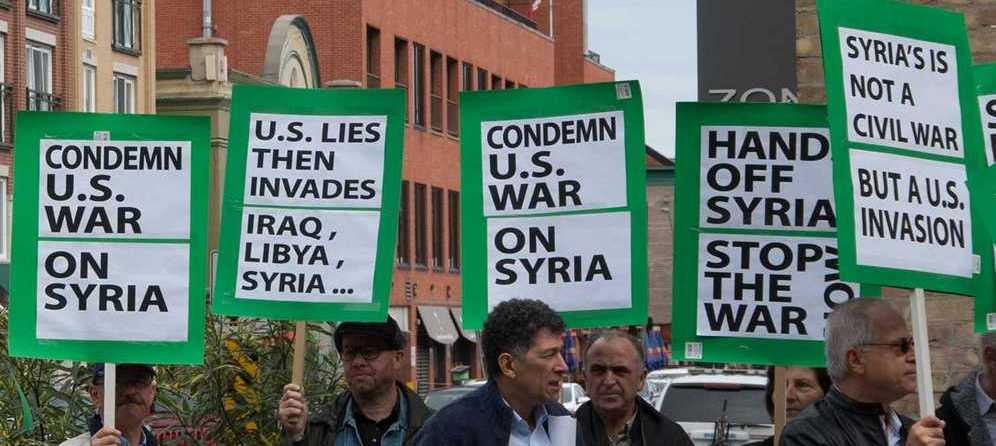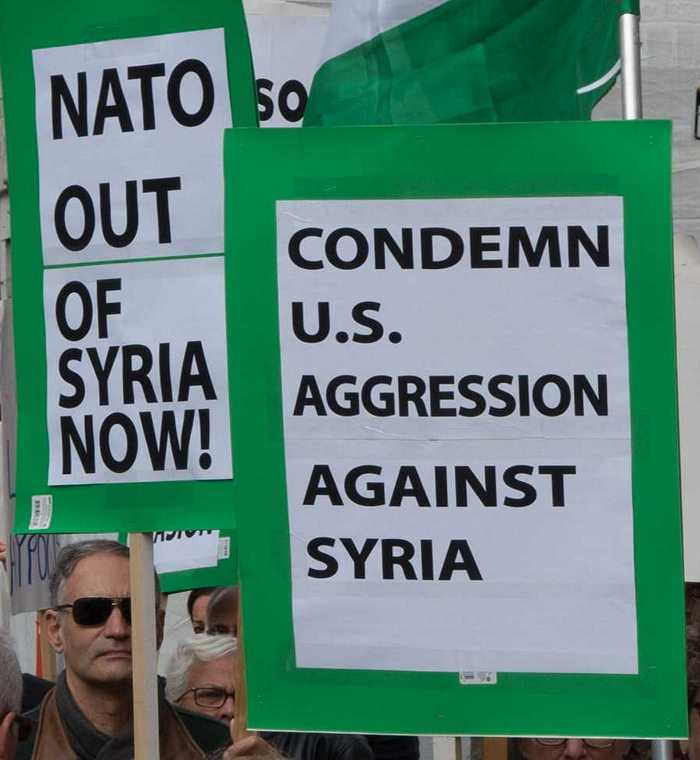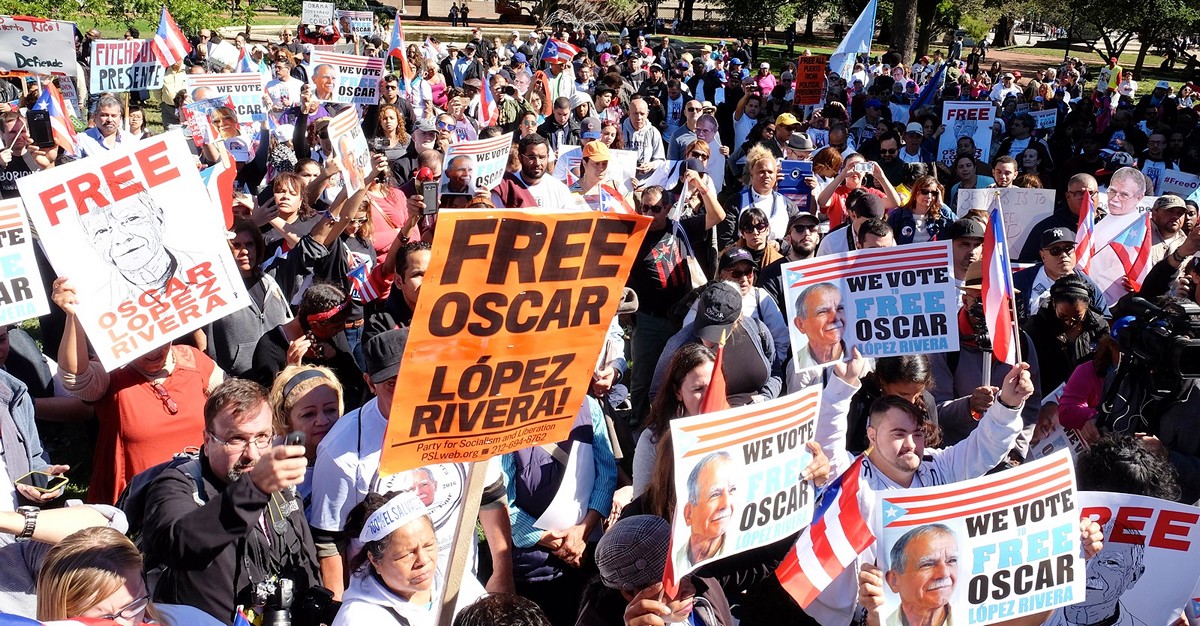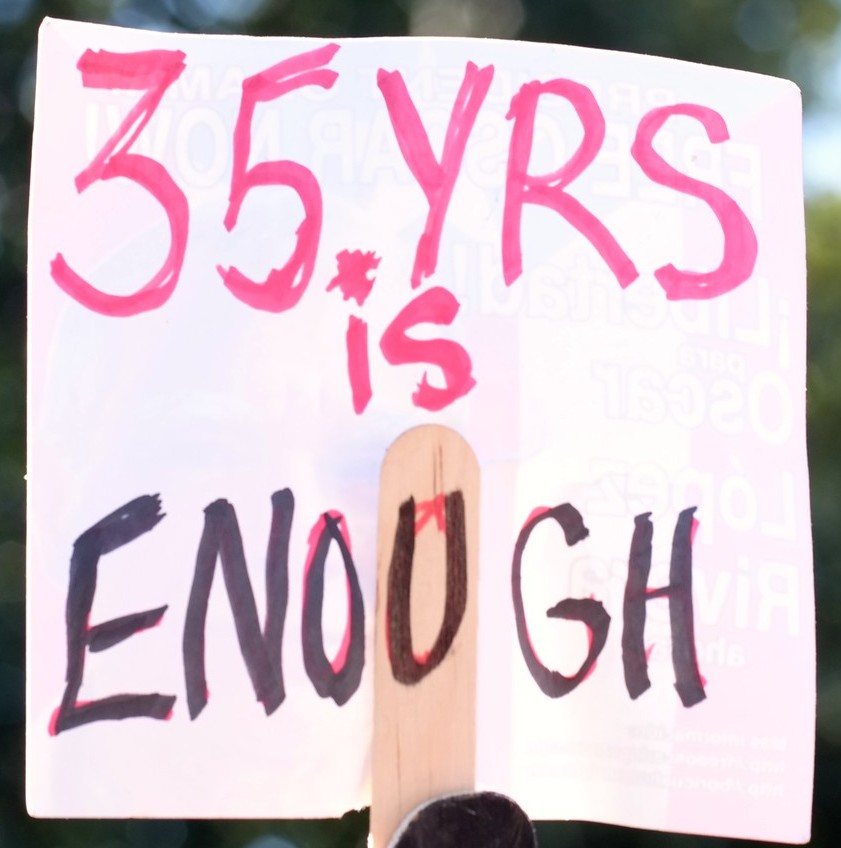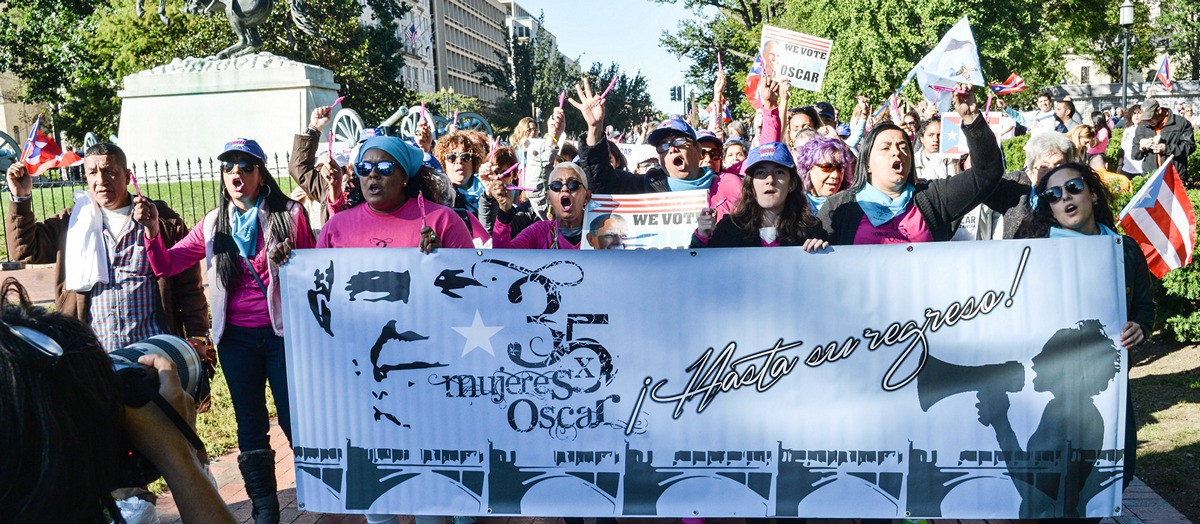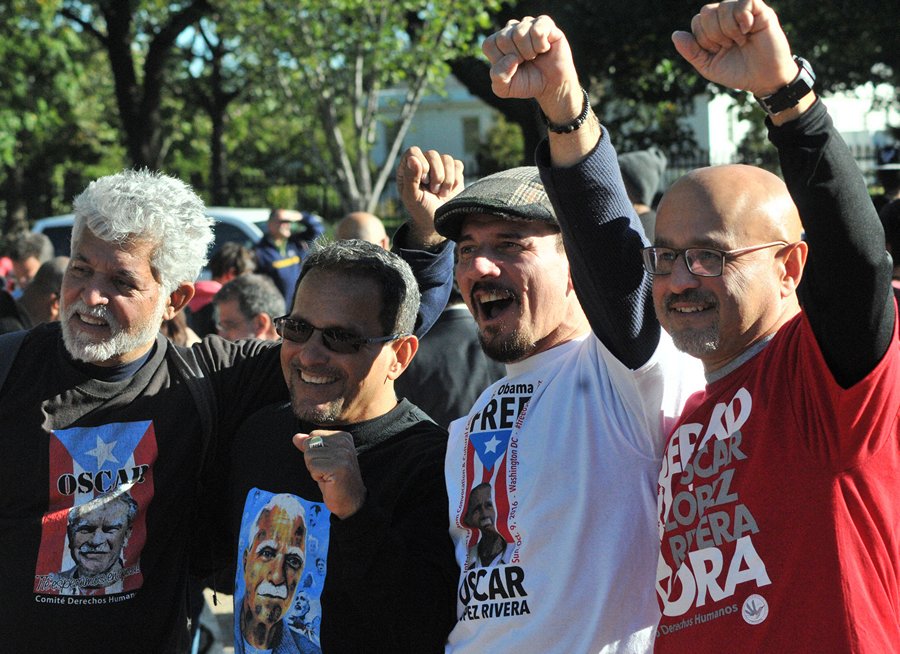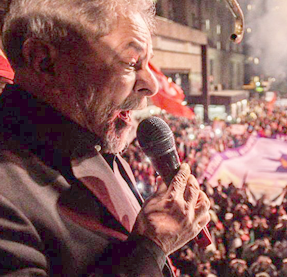
|
October 22, 2016 - No. 41 Trudeau
Government's Logic of
Canada
Calls
on
UN
Members
to One Year of Liberal Rule Trudeau Government's Logic of National Betrayal
In the anti-national tradition of previous governments, the first year of the Trudeau government confirms that it is openly embracing the warmongering, militarism and reaction of U.S. imperialism. To cover this up, it promotes the image of Canada as a force for peace, saying that peacemaking is Canada's main pursuit internationally today. Foreign Minister Stéphane Dion cites the role played by Canadian Prime Minister Lester B. Pearson in creating the UN peacekeeping force, known as the Blue Helmets or Blue Berets, at the time of the Suez Canal crisis in 1956 to say that today, under different circumstances, what Canada is doing internationally also serves the cause of peace. Speaking at a meeting of the Montreal Council on Foreign Relations on October 17, Dion said, "Sixty years, ago, the UN agreed to deploy the first peacekeeping force in history along the Suez Canal. The Blue Helmets were born and, the following year, Lester B. Pearson won the Nobel Peace Prize. This innovation had extraordinary consequences for the world. Peacekeeping forces have become a vital tool and a part of Canada's identity on the international stage."[1] Canada is "a determined peacebuilder," Dion said. To perpetuate the myth of Canada as a great "peacekeeper" and reclaim this image for the Liberal Party today, Dion hides that Pearson's actions to establish the United Nations Emergency Force (UNEF) which was deployed to the Suez Canal in November 1956 were carried out on behalf of U.S. imperialism and that the "internationalism" of the Liberal Party has always been to defend the international politics of imperialism. Justin Trudeau's "internationalism" is of the same character. The bourgeoisie in Canada identifies the pursuit of its own interests with the interests of U.S. imperialism and the Justin Trudeau Liberal "refresh" of Canada's foreign policy is a clear indication of this. Despite this, Stéphane Dion's recent speech to the Montreal Council on Foreign Relations presents a fairy tale image of Canada's foreign policy. Referring to the Harper government's reluctant participation in various international bodies and initiatives, Dion said that now with the Liberals in power Canada is "back on the world stage." It was "Not that Canada had left the world, but it was no longer playing the role expected of it," Dion said. He then listed all the things which in his mind show that Canada is "back" in its rightful place. "We are defending human rights everywhere, and have created an office for this purpose," Dion said. Canada is "especially helping countries that are choosing a democratic path," he said, adding that Canada is "attending and playing a constructive and active role in all the forums where peace is negotiated, from the Middle East to Colombia." According to Dion, "Instead of acting alone, we are following the same policy as NATO and our allies..." and "We have strengthened sanctions against countries that disturb world order, but we have done so in cooperation with our allies." Dion said there is a "common thread" linking these
policies and the "overarching goal is to make Canada a determined
peacebuilder -- peace being defined as more than just the absence of
armed conflict." To explain what this means, Dion elaborated the
differences between the world of today and the world of Lester Pearson
and his "peacekeeping." Canada "plans to return to this great
tradition, but it will do so taking into account new global realities.
We can no longer keep the peace as we did half a century ago," he said. While wars between states have disappeared, "the
conflicts that persist in the world are asymmetrical," he said, which
means "a state opposing groups of insurgents or rebels, or sometimes
terrorist or criminal networks." Using this self-serving imperialist
definition which recognizes the forces created by the U.S. imperialists
and under their command as legitimate "rebels," and others as
"terrorist or criminal networks," Dion concluded that peacekeepers are
"no longer asked to serve as buffers between states that welcome them." Instead, "Conflicts today are complex and require a modern, multi-faceted and comprehensive approach, where military, diplomatic and humanitarian responses, together with security and development initiatives, are brought together under a broader umbrella of 'peace operations,'" Dion said. Peacekeeping now means "military intervention undertaken in close cooperation with local authorities and, often, with a range of international and regional partners such as NATO, the European Union, the African Union and others." Dion adds that peacekeeping is also now about the "protection of civilians." This is the same phrase used to launch imperialist aggression time and time again. While Pearson's peacekeeping was to undermine the sovereignty of Egypt and all the fighting peoples of the Middle East and change the balance of power in the region in favour of U.S. imperialism, Dion's is to engage in direct military intervention in defence of the U.S. imperialist world order. A peacekeeper can only have one standard, that of creating the conditions for peace without, at the same time, being an interventionist and aggressor or defender of militarism and fascism. Positive neutrality under all circumstances must be the watchword if the role of peacekeeping is to be given substance and be suitable for the creation of a new world equilibrium. TML Weekly calls on Canadians to oppose service to imperialism in the name of peace and to redouble their efforts to make Canada a zone for peace.
Note 1. The UNEF was not the first UN
"peacekeeping" force. The United Nations Truce Supervision
Organization (UNTSO) was established in 1948 to monitor a
ceasefire in Palestine, while a United Nations Military Observer
Group in India and Pakistan the same year was to monitor a
ceasefire between the two countries. After the Armistice
Agreement in the Korean War in 1953 UN forces remained as
"peacekeepers" on the south side of the Demilitarized Zone until
1967 when U.S. and south Korean troops took over.
Canada Calls on UN Members to Canada Champions U.S. Cause to Prolong War to Achieve Regime Change
The Communist Party of Canada (Marxist-Leninist) calls on Canadians to condemn the Trudeau government's attempt to use the United Nations against the sovereignty of Syria and to endorse more U.S.-led terrorism. At a time that the U.S. imperialists are expressing serious worries about the inability of their proxy forces in Syria to successfully fight the Syrian army, Canada is spearheading a new initiative at the United Nations aiming to prolong the war and step up the push for regime change. This initiative is being falsely described as contributing to peace and an end to the conflict while it is in fact in direct response to the failure of the U.S. imperialists to get authorization to commit aggression against Syria through the UN Security Council. An informal plenary session of the General Assembly in response to Canada's request was held on October 20. On that occasion Prime Minister Justin Trudeau issued a statement calling for "forward momentum" for war against Syria under the banner of "a collective responsibility to protect the world's vulnerable and weak when others cannot or will not." A special meeting of the General Assembly has not yet been announced. Earlier on October 11, three days after the Russian veto at the Security Council, Canada's Minister of Foreign Affairs Stéphane Dion spoke about these efforts at a meeting of the Atlantic Treaty Association, a political front for NATO comprised of politicians, diplomats, military personnel, academics and businesspeople. Dion said that Canada is "reaching out on an urgent basis to see what can be done to address the appalling situation in Syria in the wake of Russia's veto at the UN Security Council on [October 8]. This could include action at the General Assembly to address the unfolding humanitarian crises in Syria." Canada, which is openly campaigning for a UN Security Council seat beginning in 2021, is attempting to use the UN General Assembly to achieve what the U.S. imperialists and their allies were denied at the Security Council. Canada's initiative is supported by all the countries on the UN Security Council which supported the vetoed resolution. Canada's request comes with support from 71 other UN member states, calling for an emergency session of the full General Assembly under Resolution 377, known as "Uniting for Peace."[1] Resolution 377 was written by the U.S. in 1950 to bypass the authority of the Security Council and manoeuvre around the Soviet Union which sought to prevent the imperialists from further use of the UN Security Council to support the U.S. genocidal war against Korea.[2] Resolution 377 states that, "where the Security Council, because of lack of unanimity of the permanent members, fails to exercise its primary responsibility for the maintenance of international peace and security, the General Assembly shall seize itself of the matter." Canada's initiative at the UN was launched one week
after the ceasefire negotiated between the U.S. and Russia collapsed
due to the U.S. bombing of Syrian troops and because many of the U.S.
proxy forces refused to abide by it. Within one week we are to believe
that Canada all by itself and without connection to anything the U.S.
bloc is up to, including the massive disinformation about the
humanitarian tragedy in Aleppo, assembled 71 states to back its
manoeuvre to expel one of the member states of the United Nations or
"legitimize" aggression against it. It is very telling that while
claiming everything it is doing is for peace, Canada only raised doubts
about Russia and the Syrian governments' unilateral pause in fighting
in Aleppo, from October 18 to 22 to allow civilians as well as
anti-government fighters to evacuate from eastern Aleppo. Canada's criminal manoeuvre aims to "legitimize" war in a manner not unlike UN Security Council Resolution 1973 that authorized a "no-fly zone" in Libya in 2011. That resolution was used by the U.S. and NATO as the "legal" basis for its merciless destruction of Libya's cities, infrastructure and citizens and its imposition of a puppet government. Permanent members of the UN Security Council such as Russia and China subsequently expressed regret for allowing Resolution 1973 to pass as its effects went far beyond what was discussed and the result was further destabilization of North Africa and the Middle East. It is therefore very difficult for the U.S. to have similar measures adopted at the Security Council today. A serious concern is that the U.S. imperialists now aim
to use a UN General Assembly resolution and the claims of dysfunction
at the UN Security Council to justify aggression. The vitriol at the UN
from the U.S. representative, Samantha Power, is such that everything
is blamed on Russia and the post-war arrangements by which Russia was
included as one of five world powers granted a veto at the Security
Council is now declared to be illegitimate due to Russia's obstinance.
Writing for the website LawFare, a pro-war legal analyst named Mai El-Sadany speculated as to how the U.S. could use a General Assembly resolution to justify war. In spite of a General Assembly resolution not carrying the weight of a Security Council decision, "the time has come for the international community to explore creative and lesser-known solutions," she said. "The calamity in Syria has uncovered what many legal scholars have long criticized as a set of international institutions and legal constructs that have failed to evolve with the evolving nature of conflict. It is only by reassessing and deconstructing the status quo that we can even begin to produce solutions adequate to addressing the Syrian crisis..." El-Sadany claimed that Canada's move originates with a foreign-sponsored organization posing as an interim government called the "Syrian Coalition," and that the ultimate purpose of a UN General Assembly motion "would be to recommend non-binding collective measures for the matter at hand, which can include, but are not limited to, the implementation of a ceasefire, the use of force, or sanctions."
Canada's call is an attack against the Charter of the
United
Nations, which upholds the sovereignty and territorial integrity
of member states.[3] Many
states, which have condemned both the overt and covert aggression
of big powers to subvert the Syrian Arab Republic, are also
convinced that such powers' sponsorship of terrorist gangs fall
within the category of official state terrorism. Canada's actions serve
only to further the conflict in Syria and justify foreign intervention
by the U.S. and its allies. In this regard, Canada and those supporting this initiative should be careful. What goes around, comes around and, despite all the back-room screw-tightening, it is far from a given that UN member states will agree to open the door to measures which can be used to attack their own sovereignty at any time.
Notes1. Albania, Antigua and Barbadu, Argentina, Australia, Austria, Bahrain, Belgium, Brazil, Bulgaria, Canada, Colombia, Costa Rica, Coatia, Cyprus, Czech Republic, Denmark, Egypt, Estonia, Fiji, Finland, France, Georgia, Germany, Greece, Guatemala, Hungary, Iceland, Ireland, Israel, Italy, Jamaica, Jordan, Kuwait, Latvia, Lichtenstein, Lithuania, Luxemburg, Malaysia, Maldives, Malta, Mexico, Federated States of Micronesia, Moldova, The Kingdom of the Netherlands, New Zealand, Norway, Palau, Panama, Peru, Poland, Portugal, Qatar, Romania, San Marino, Saudi Arabia, Slovakia, Slovenia, Spain, Sri Lanka, Sweden, Switzerland, Thailand, Tunisia, Turkey, Ukraine, United Arab Emirates, United Kingdom of Great Britain and Northern Ireland, United States of America and Uruguay. 2. The Soviet Union had earlier been unable to veto the June 1950 resolution supporting U.S. intervention in Korea due to its boycott in protest of the exclusion of the People's Republic of China from the UN. 3. The UN Charter states, under Chapter I: Purposes and Principles: "The Organization is based on the principle of the sovereign equality of all its Members." [...] "All Members shall refrain in their international relations from the threat or use of force against the territorial integrity or political independence of any state, or in any other manner inconsistent with the Purposes of the United Nations."
General Assembly Briefing on
|
|
|
Former Puerto Rican political prisoners including Luis Rosa, Ricardo Jimenez, Edwin Cortes (given presidential clemency by Pres. Bill Clinton) and Felix Rosa -- all of whom have been relentless in the campaign to Free Oscar -- were present.
López writes, "There were many speakers from all walks of life and representing all political ideologies, a norm for Oscar who has become the moral power to unify forces. The event was organized by a coalition in Puerto Rico and the mobilization came from the diaspora."Along with ecumenical figures, speakers included, Congressman Luis Gutiérrez; New York State representative Adriano Espalliat; New York City Council Speaker Viverito; candidate for Puerto Rico governor María de Lourdes Santiago; San Juan Mayor Carmen Yulín Cruz; Professor of Philosophy and Christian Practice at Union Theological Seminary and Professor Emeritus at Princeton University Cornel West, who sent a recorded message, and Rene Perez, El Residente de Calle 13. Danny Rivera, Roy Brown and Tito Auger and others participated in the cultural event that followed. Some did interpretations of Juan Antonio Corretjer's songs and Danny Rivera sang "Tu Pueblo es mi pueblo."
López describes when Oscar's family came onto the stage as the 'high point of the rally.' She writes: "Oscar's youngest brother, José E. López spoke so eloquently about the family's desire for 35 years to bring him home. He related anecdotes of the trials and tribulations and Oscar's enduring strength that transcended the prison bars to the family."
|
|
Clarisa, Oscar's daughter, said that if all that attended got on board to work the campaign in the next 105 days -- the number of days Obama has left in office -- "we can become a force to be reckoned with and secure Oscar's release."
López concludes, "We called [our event] a 'mission accomplished' in the crunch time of only 5 weeks. Imagine if we had a year to plan it. We were decolonized in this process especially when we felt the unity that Oscar promotes and clamor for freedom he represents.
"We waited to hear from Oscar on this important day, as
we
are sure he felt all that energy and love. Again, we will record
in our collective memory, the day Oscar was in Pres. Obama's
house. We reiterate, 'Pres. Obama with a stroke of your pen, FREE
Oscar, Now!'"

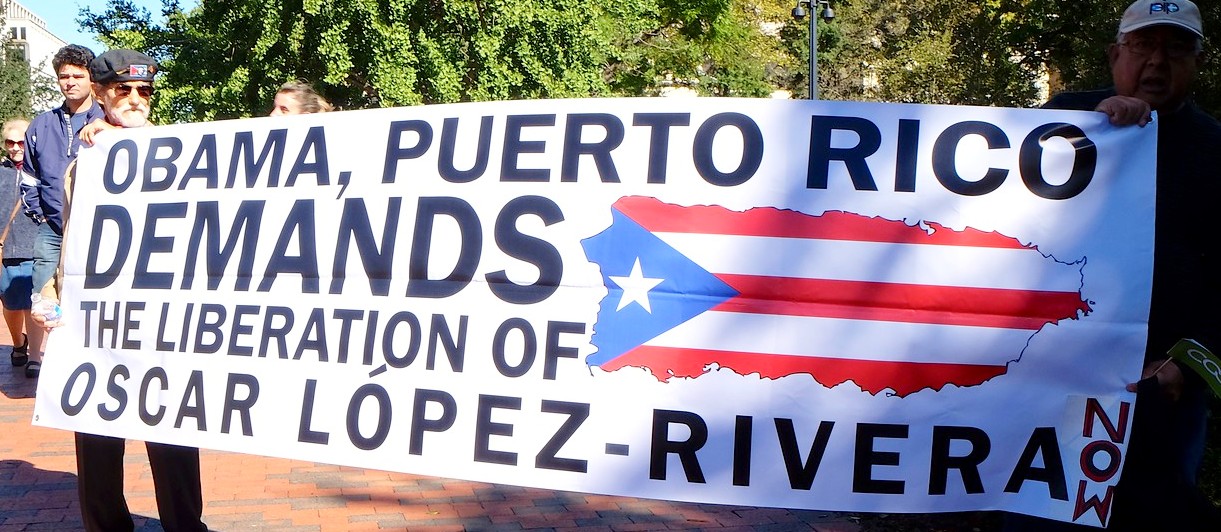

(Photos: Virtual Boricua, E. Carmona, C. Billups, C. Munoz)
Attack on Brazil's Constitution and Democracy
Coup Government's Constitutional Amendment Imposes Neo-Liberal Cuts to Social Spending

Demonstration in Fortaleza, August 9, 2016 against Temer
government. (Midia Ninja)
The coup government of de facto president Michel Temer has begun to impose neo-liberal reforms on the broad masses of Brazilian people through Proposed Constitutional Amendment (PEC) 241 as part of the overall aim of putting all the social wealth at the disposal of the rich. The first round of voting on PEC 241 took place in Congress on October 10, passing with a vote of 366 in favour and 111 against, with two abstentions. Changes to PEC 241 were passed on October 18 by a Special Commission of Congress with the support of 21 legislators against seven opposed. PEC 241 now goes to the Senate for final approval via two rounds of voting. Mass protests against the neo-liberal measures continue across the country.
In the days leading up to the first vote in the Chamber of Deputies, Temer and his supporters whipped up hysteria about a "catastrophic" situation that will face the country if public spending is not immediately reined in. On October 9, Temer met with 200 congressmen that back his coup government to bolster support for PEC 241. One of the main arguments given to justify the brutal austerity of PEC 241 was that it is to spare the people from having to make the sacrifices that come with a tax increase, Folha de São Paulo reported. Temer attempted to motivate his base by recounting de facto Finance Minister Henrique Meireilles' meetings with investors in the U.S., who said they had faith that the amendment would be approved.
Vermelho, a publication of the Communist Party of Brazil (PCdoB) points out that Brazil's Constitution, enacted in 1988, is now under the most intense attack by reactionary forces that have always rejected the economic, political and social advances it enshrines. In the name of "modernity" they are corrupting the Constitution to favour powerful private economic interests, contradicting the need to develop the country and its sovereignty.
PEC 241 amends Brazil's tax system to encourage profiteering and financial speculation, Vermelho explains. It eliminates the constitutional requirement for public spending on social programs such as health care and education. Instead, public spending is now limited to the previous year's inflation rate for the next 20 years. Meanwhile, interest payments on the national debt slated in the budget have been left intact. The item from Vermelho continues:
"The damage to the people is immense. The Constitution states that 18 per cent of federal revenues from taxes should be spent on education, plus another 25 per cent from the taxes collected by states and municipalities. In another vital area for people, health, the mandatory constitutional use of public money corresponds to a percentage of the country's net revenue going from the current 13.2 per cent to 15 per cent in 2020. With regard to education, the National Education Plan states that the required investments, which are now 7 per cent of GDP should reach 10 per cent in 2024.
"Another massive attack will be against social assistance. If PEC 241 is approved, the damage may exceed or reach R$860 billion! [...]
"[...] public debt does not result from private sector loans to meet the government's needs. It actually serves the interests of the financiers to lend to the government so they can snatch up the extortionate interest paid on the public debt, which historically ranges between 47 to 50 per cent of the federal budget.
"It is a perverse system in which the state is taken hostage by financial speculation and profiteering.
"[...] setting a ceiling on public spending will block the development of the country and the people's well-being through job creation and increased wages. And [PEC 241] favours only high finance that dominates the country."
Vermelho calls on all progressives and democrats to defend the Constitution and vigorously reject financial speculation and privileges for the rich.
Background on Brazil's Constitution
The PCdoB explains in an October 5 item the significance of Brazil's 1988 Constitution, recounting the experience of Harold Lima, former deputy in the 1988 National Constituent Assembly, who was very active in work to create the constitution.
"Lima became known at the time the draft constitution was being debated in Congress. He struggled to incorporate more democratic proposals and advance some 1,200 amendments, and succeeded in having several of them approved.
"[... He] pointed out that the Constitution was a great victory of the Brazilian people and was achieved after many battles in the 21-year fight against the military dictatorship. 'The Constitution is the outcome of this struggle, and it is therefore a progressive victory. It was made at a time when the people were mobilized and attentive in defence of their rights, in defence of their nationality,' Lima said.
"[He] cited the fifth chapter of the Constitution which for him is the most complete and up to date in the world regarding individual and collective rights. This Article extended the rights of individuals and allowed their protection in various situations.
"'All are equal before the law, without distinction of any kind, guaranteeing to Brazilians and foreigners residing in the country the inviolable right to life, liberty, equality [...],' says the accompanying article 78.
"The fifth chapter is the most important contained in the federal Constitution, also called the 'Citizen Constitution.' One of its fundamental principles is that of equality."
Lima points out that the Constitution is only realized when the people are organized on the basis of progressive views. To demobilize the people and promote backward ideas is to end everything positive for the people, he said, adding that everyone must celebrate and collectively defend the current constitution.
Aldo Arantes who served as a federal deputy of the PCdoB four times, highlights the Constitution as a vital element in defending the democratic rule of law. He said that the attack on constitutional rights through PEC 241 is the formalization of the coup that culminated in the impeachment of President Rousseff.
Aldo points out that the coup government will carry out further neo-liberal measures to alter the Constitution to meet the needs of the market, rather than the people.
Aldo urges the people to build their forces to take
action against the neo-liberal offensive: "It is time to focus on the
struggle for democracy, centering on the struggle in defence of the
Constitution against neo-liberal policies, for rights, progressive
labour reforms, tax reform [...]"
(With files from TeleSUR, Folha de São Paulo, Vermelho, PcdoB. Photos: Midia Ninja, PT, Journalistas Livras. Quoted text has been slightly edited for style and grammar by TML.)
Mass Actions in Defence of Social Programs
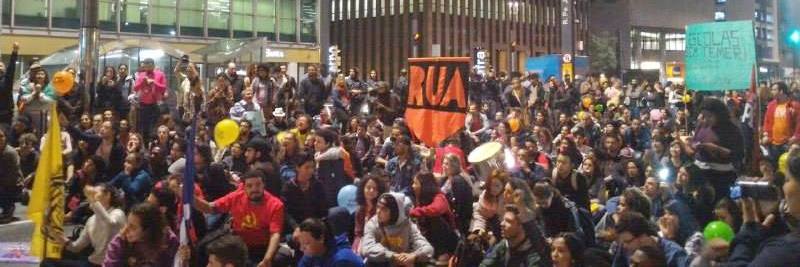
Demonstration in São Paulo, October 10, 2016.
Members of social movements, political organizations and
collectives, as well as
civil society representatives took part in a mass
demonstration on October 17 in Rio de Janeiro against the Temer
government's Proposed Constitutional Amendment (PEC) 241 and its
attack on rights. An estimated 5,000 people took part. This
action followed mass protests in São Paulo on October 10 and
Porto Alegre on October 11 also to denounce PEC 241.

Demonstrators face state repression in Porto Alegre, October 10, 2016.
Meanwhile, highschool students are occupying schools
across the country in protest of the Temer regime's plans to cut
funding for public education. The neo-liberal reforms to public
education were announced in September and are in addition to those
contained in PEC 241. The actions began in the southern state of Parana
on October 3 and spread to other states. As of October 9, students
occupied some 60 schools. The website of the Workers' Party reported on
October 20 that occupations are now taking place in at least 1,000
highschools and more than 20 universities.
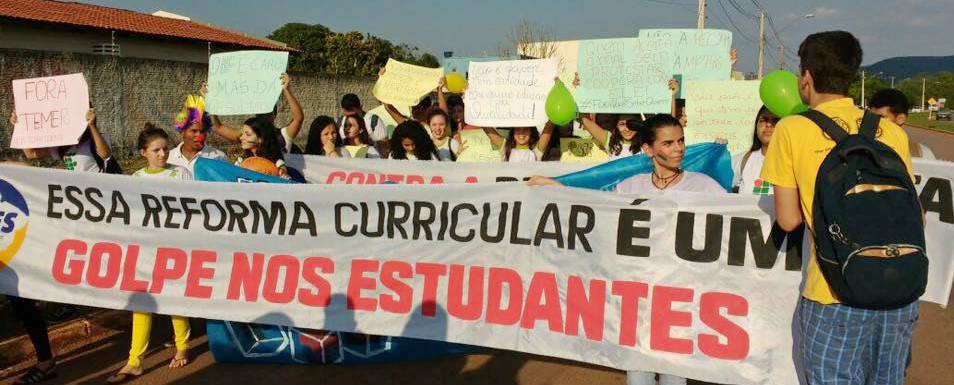
High school students occupy schools across the country.
In Parana, the public school teachers' union (APP) issued a statement October 7 to recognize that the occupations are aimed at defending quality public education and to voice the concerns that teachers also share. The union announced it has plans to strike.
"We reject the proposals of Michel Temer's government that threaten education," said teacher and APP President Hermes Leao in the statement, adding that teachers welcome the students' actions. "We will not accept a rollback of workers' rights, much less unilateral and arbitrary decisions to change education."
The Brazilian Union of Secondary Students has called
for
donations, including food and toiletries, to help sustain the
protests.
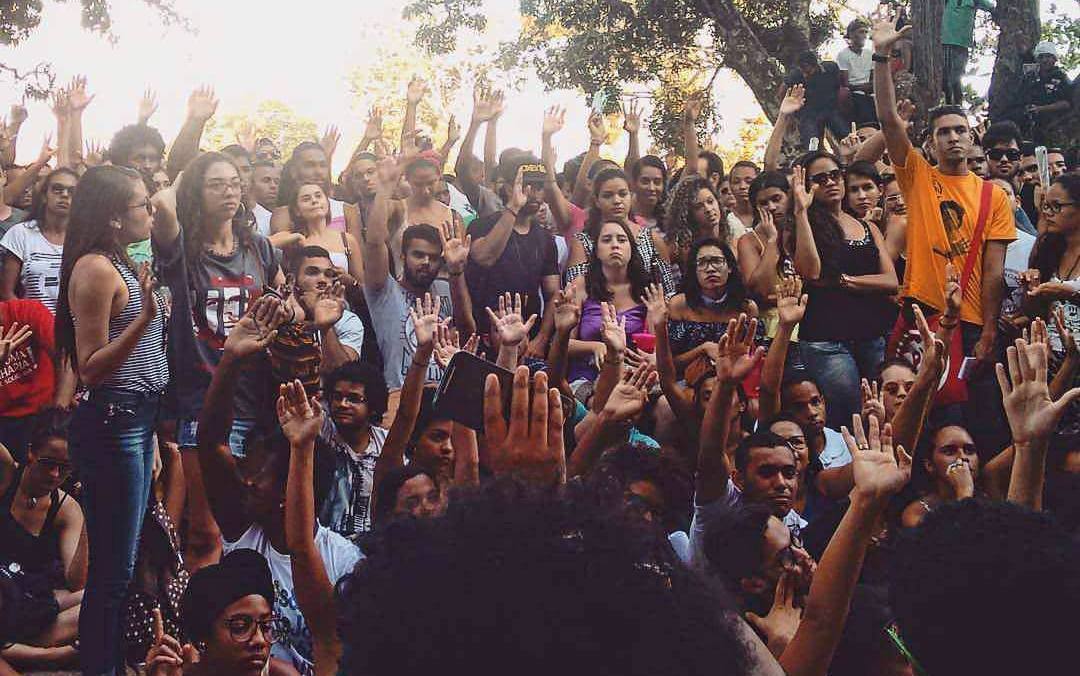
Students from all campuses of Recôncavo da Bahia University
vote to join the protests, October 20,
2016.
(PT, Vermelho, TeleSUR. Photos: Midia Ninja, PT, Journalistas Livras.)
Spurious Case Against Former President Da Silva
The reactionary forces behind the trumped up impeachment of President Dilma Rousseff of the Workers' Party (PT) are pursuing a similarly spurious case against Rousseff's predecessor Luiz Inácio "Lula" da Silva also of the PT. Brazil only permits a president to hold office for two consecutive terms. Thus, despite exceptional popularity amongst the people, whose living and working conditions greatly improved during his tenure, Lula stepped down after serving two terms as president, from 2003 to 2010 and is the honorary president of the PT. He is widely expected to run for president in the next election to defend the social gains achieved by the workers and people and to build on them.
TML is posting below an October 8 article by Lula entitled, "Why They Want to Condemn Me."
***
For more than 40 years as a public figure, my personal life has been continuously scrutinized -- by public security agencies, political adversaries, the press. Because I have worked for the workers' freedom to organize, I was even arrested and sentenced for subversion by the infamous National Security Law of the Brazilian dictatorship. But they have never found a single illegal act from my quarter.
I know what I did before, during and after I was president. I have never committed a crime, I have never done anything that might stain my reputation.
|
|
I was the president of Brazil with integrity and dedication because I knew that a worker could not make any mistakes as president. The false accusations they have made against me were not intended to harm me as a person, but the political project that I have always represented: a country with more justice and opportunities for all.
Now, shortly before my 71st birthday, I see my name at the center of a real judicial hunt. They have investigated my personal accounts thoroughly, as they did with my wife's and my children's; they wiretapped my phones and disclosed the contents of my calls; they invaded my home and forced me to testify in a bench warrant, without a plausible reason or legal grounds.
They are looking for a crime to accuse me of, but they haven't found one and they will not find one.
Ever since this hunt began, during the 2014 presidential campaign, I have travelled along the course of Law, but I never gave up my plans. I still travel across the country, I meet with labour unions and representatives of social movements and leaders of political parties to debate and defend the project to change this country.
I didn't stop to lament nor did I give up the fight for equality and social justice. In these meetings, I renew my faith in the Brazilian people and in the future of the country.
I can verify that every achievement we reached during the PT administrations is still alive in our people's memory and they include the projects of Bolsa Família, Luz Para Todos, Minha Casa, Minha Vida, the new Pronaf (National Program to Strengthen Family Farming), the Program for Food Purchasing, the appreciation of workers' salaries -- altogether, these programs drove the biggest social ascension in the history of Brazil.
Our people will never forget the millions of young, black and poor people who have obtained more access to a college education. Brazilians will resist the current setbacks because Brazil wants more, and not fewer, rights.
I cannot keep quiet, however, when I see the abuses performed by government agents who use the law as an instrument of political persecution. That was made clear in the second round of the municipal elections. All you have to do is to see how the PT has been the target of a hunt: the acceptance of an accusation against me, five days after it was presented, and the arrest of two former ministers of my administration were theatrical episodes that certainly affected the results of the elections.
I have never performed, authorized or benefited from illegal acts in Petrobras or any other government sector. Since the 2014 election campaign, we have heard the narrative that the PT is no longer a political party, but a "criminal organization," and that I was the leader of this organization.
This idea has been reinforced over and over again by newspaper headlines, magazine covers, on the radio and on television. The idea must be proved by force, as "there aren't facts, but convictions."
I believe that those who accuse me really believe in this malicious thesis, perhaps judging everybody else according to their own moral standards. But the fallacy of this story is quite clear, especially given the difference between the billion dollar embezzlements under investigation and what they say is the fruit of the alleged plunder of the "head of the criminal organization."
I also see a dangerous ignorance on the part of agents of the law regarding the way the government and the institutions work.
I reached this conclusion during the testimonies that I gave and that were written down by police chiefs and public prosecutors who did not know how a coalition government works, the proceedings of a provisional measure or of a bidding process, or even how the joint and technical analyses and approvals of financing in a public bank, such as the Brazilian Development Bank (BNDES), work.
Besides, during these testimonies, I was never objectively questioned on the hypothesis underlying the accusation. I really have the impression that they were nothing but empty bureaucratic rites, to perform the official steps and carry out formal proceedings. Certainly they did not serve the concrete exercise of the right to a defence.
Two years after these operations, which were always disclosed with much fanfare, they did not manage to find anything they could use to connect my name to the embezzlements under investigation.
Not even a single penny did I fail to declare, nor did they find a front company or a hidden account.
I have lived in the same apartment in São Bernardo for the last 20 years. Among the dozens of defendant informers, none of them said they had any illegal or dishonest business with me, in spite of the public agents' insistence for them to do so, and even with the possibility of benefiting from doing so.
The careless, disproportionate accusations, without any legal grounds, are surprising and disgusting -- in much the same way the judges process them with diligence.
They don't care for facts, evidence and correct legal proceedings any more. They accuse and process the accusations based on mere belief -- and the fact that the higher courts and agencies of functional control take absolutely no measures regarding it is very serious.
They have accused me, for example, of having received an apartment from illegal sources -- an apartment that has never belonged to me simply because I did not want to buy it when the opportunity arose, not even after it was renovated -- which would make its price increase, obviously. As it is impossible to demonstrate that the apartment belongs to me, because it never did, I have been accused of hiding it, in a surrealistic tale.
I have also been accused of corruption as I allegedly gave lectures to companies investigated by the Federal Police's Operation Car Wash.
How can I be accused of corruption if I haven't had a public job since 2011, when I began to give these lectures? And what relation could there be between the embezzlements in Petrobras and the lectures, all of them recorded, which I gave to 42 companies and organizations of various sectors, not only the five under investigation, charging the same price and paying taxes on them?
Those who accuse me know that I did not steal, that I was never corrupted and never tried to block investigations -- but they cannot admit it. They cannot go back after the massacre they have promoted in the press.
They became prisoners of the lies they created, most of them from factious or poorly investigated news reports. They are condemned to condemn and they must keep in mind that, if I am not arrested, they will be demoralized in the eyes of the public.
I try to see this hunt as part of a political dispute, although it is a disgusting way of fighting. They are not trying to condemn Lula: they are after the political project that I represent along with millions of Brazilians.
In their attempt to destroy a way of thinking, they are destroying the pillars of democracy in Brazil.
We must stress that we, members of the PT, have always supported the investigations, trials and punishment of those who embezzle public money, the money that belongs to the people. That is not a rhetorical statement: we fight corruption in practice.
No other person has done so much to create transparency mechanisms as well as those to control public funds, to strengthen the Brazilian Federal Police, the Brazilian Internal Revenue Agency and the Public Prosecutor's Office. We have worked hard to approve in Congress more efficient laws against corruption and organized crime. That was recognized even by the prosecutors who are accusing us now.
My mind is at ease and I have the Brazilian people's recognition. I believe that, sooner or later, justice and the truth will prevail, even if it only occurs in the history books.
What worries me and all those who truly defend democracy are the continuous violations against the democratic state ruled by law. It is the shadow of the state of exception that is beginning to rise in the country.
(Folha de São Paulo. Translated
from
Portuguese by Thomas Muello. Slightly edited for style and
grammar by TML.)
Peace Process in Colombia
Ceasefire Extended
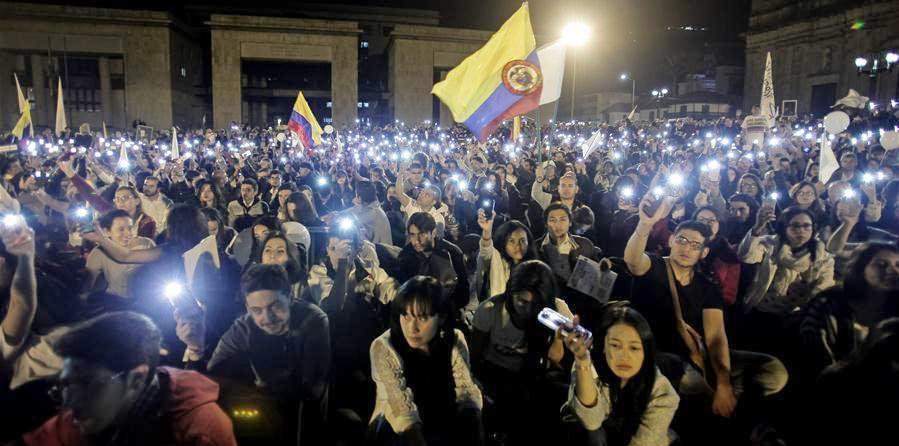
"March of Light" for Peace, Bogotá, Colombia, October 20, 2016.
After the Peace Agreement signed between the government of Colombia and the Revolutionary Armed Forces of Colombia People's Army (FARC-EP) was narrowly rejected in the October 2 plebiscite, Colombian President Juan Manuel Santos said the government would only maintain its side of the bilateral ceasefire until October 31. Then on October 14 Santos announced an extension to December 31. In a televised address, Santos said the decision came after meeting student leaders who organized marches in support of peace. "One of the students reminded me that in the army and in the guerrilla ranks, there are young people waiting to see what happens, hoping that they don't need to fire another shot," he said.
In a communiqué the same day, the Central High
Command of FARC-EP welcomed the government's decision and reaffirmed
its own
observance of the ceasefire. The Central High Command informed
that it is putting its full attention behind evaluating the
latest proposals that have been received to advance peace,
"always giving priority to defending the most heartfelt interests
and dignity of the Colombian people." They also pledged to
"confront in the field of ideas all those who try to hinder
peace."

Women march for peace in Bogotá.
FARC-EP praised the mass demonstrations that have been
taking
place on a daily basis around Colombia and abroad in support of
peace and for the implementation of the Peace Agreement reached
in Havana without further delay.
National Day for Political Prisoners Observed in Colombia
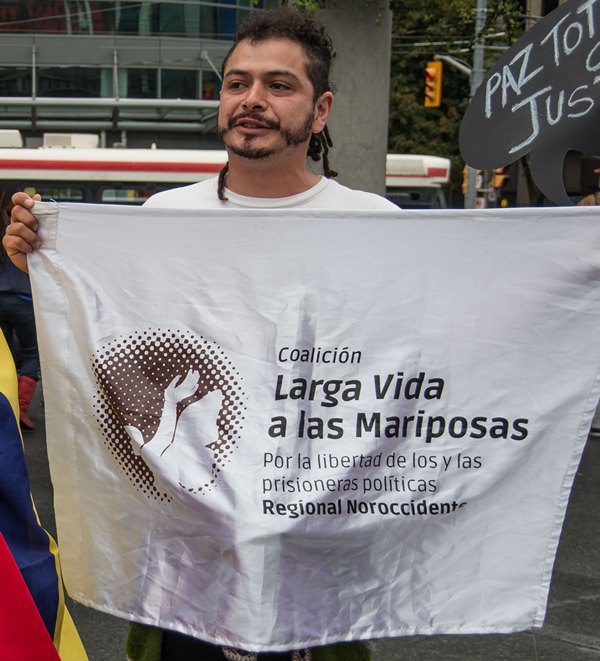 October 15 marked
Colombia's National Day for Political
Prisoners, the History of Resistance and Dignity. It marks the capture
and execution of union leader Luis Carlos Cárdenas
Arbeláez in the city of Medellín by the Colombian state
in 1973.
The date is used to commemorate the thousands of political
prisoners held in Colombian jails and denounce the state's use of
imprisonment and repression as a response to protest. October 15
took on a new significance this year as a result of the
development and implementation of the General Agreement for the
Termination of the Conflict, the Special Jurisdiction for Peace
component and the Amnesty Law for what are classified as
"political and related crimes" associated with the internal armed
conflict contained in the Final Peace Agreement reached between
the FARC-EP and the Colombian government.
October 15 marked
Colombia's National Day for Political
Prisoners, the History of Resistance and Dignity. It marks the capture
and execution of union leader Luis Carlos Cárdenas
Arbeláez in the city of Medellín by the Colombian state
in 1973.
The date is used to commemorate the thousands of political
prisoners held in Colombian jails and denounce the state's use of
imprisonment and repression as a response to protest. October 15
took on a new significance this year as a result of the
development and implementation of the General Agreement for the
Termination of the Conflict, the Special Jurisdiction for Peace
component and the Amnesty Law for what are classified as
"political and related crimes" associated with the internal armed
conflict contained in the Final Peace Agreement reached between
the FARC-EP and the Colombian government.
The National Secretariat of the FARC-EP noted however
that
the repressive nature of the state remains, and pointed out that
the Colombian government "introduced the model of U.S. punishment
exported from the Federal Bureau of Prisons of the United States
Department of Justice, implementing... a prison model for the
enforcement of punishment to the growing and legitimate
mobilizations and social protests of Colombians." The National
Secretariat affirmed that despite the setback of the October 2
plebiscite, it holds as "an unavoidable principle, the exit from
prisons of all our comrades and civilian prisoners accused or
convicted of collaborating with the FARC-EP" and insists on
amnesty as a prerequisite for a stable and lasting peace.
The FARC-EP National Secretariat called for October 15 to be an occasion to "pay special tribute to all women and men whose imprisonment is another trench of struggle, who display the highest morality and dignity, and for whom the bars do not dent their desire for peace with social justice."
Paramilitary Violence Continues
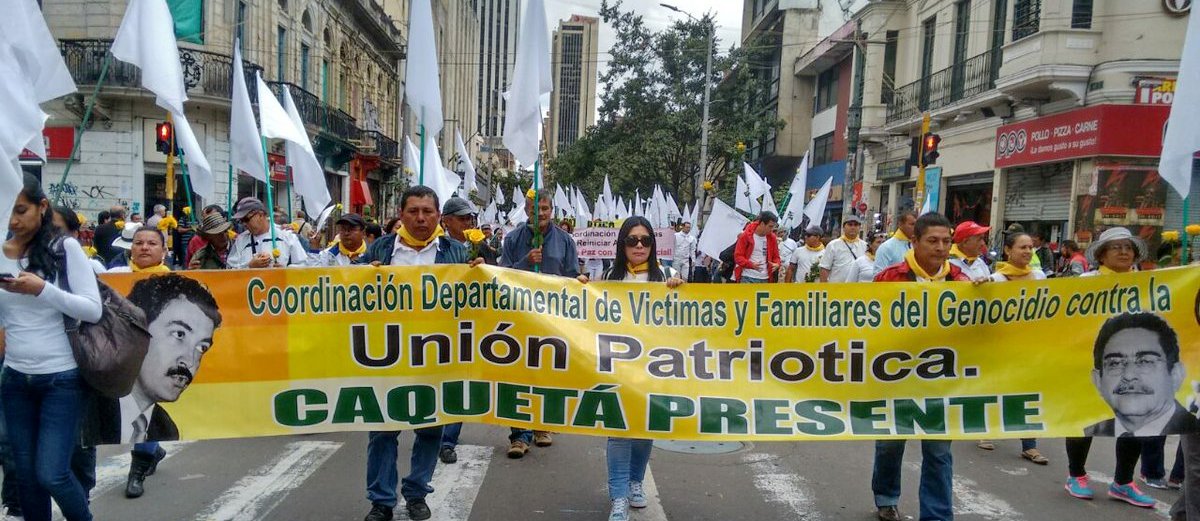
March for the Dignity of the Victims, October 20, 2016, by all those
victimized by the
state terrorism unleashed against the Unión Patriotica Party.
On October 19 rural activist Esneider González, a member of the Art, Peace and Life Victims' Association and the social and political movement Marcha Patriotica was the subject of an assassination attempt at the door of his house in Corinto in the department of Cauca. He was shot several times by an unknown assailant but survived and is recovering. González is reported to have participated earlier this year in a visit by the United Nations-led Monitoring and Verification mission to a property where FARC-EP members in the region were to gather for six months in preparation for re-integration into civilian life and to hand over their weapons under the terms of the peace accord. There have been seven human rights defenders assassinated in Cauca so far this year. Three days earlier Ymer Chavez Rivera was shot and killed outside his home by hooded men on a motorcycle. Chavez was a member of the Campesino and People's Guard which worked to protect and implement peace and justice in rural communities. A statement from the The Organization for Urban and Campesino Development which created the Campesino and People's Guards said that despite the advances in the peace process, "The Department of Cauca has been affected by an increasing number of attacks and threats against the men and women who organize the defence of the territory."
Another report from an organization that tracks
killings of
human rights defenders in Colombia identified 19 activists who
were killed between July and September, mostly by paramilitaries
where the perpetrators are known. That organization noted that
several attacks were carried out during the campaign for the
plebiscite and pointed out that this kind of intimidation
contributed to the victory of the No camp.

March for Peace, Corozal, Department of Sucre, October 18, 2016.
A separate report presented this week to the UN Human
Rights
Council by the Colombia-Europe-United States Coordinator
representing 269 human rights organizations provided evidence of
continuing systematic human and civil rights violations in
Colombia along with insufficient implementation of policies and
legal provisions to address the situation. Commenting on the
report the FARC-EP said that it "raises serious concerns on the
capability of the State to guarantee basic human and civil
rights, the political willingness to overcome the systematic
violation of these rights by the State and paramilitary forces,
and the highly anticipated end of the armed conflict." It also
points out that this is all the more reason for implementation of
the Peace Agreement with victims' rights at its core, not to be
further held up. The Colombian people continue to fill the
streets and main squares of their cities, towns and villages to
raise the same demand, many under the banner "Acuerdo Ya!"
(Agreement Now!)

"Garden of Memories" in Bogotá, October 20, 2016, honours the
thousands
of
Unión Patriotica
activists killed by state and paramilitary forces.
(With files from www.farc-epeace.org, TeleSUR, Contagio Radio. Photos: Agencia Prensa Rural, R. Villalba, I. Cepeda, L. Obando, Xinhua.)
Interview with FARC Commander Iván Márquez
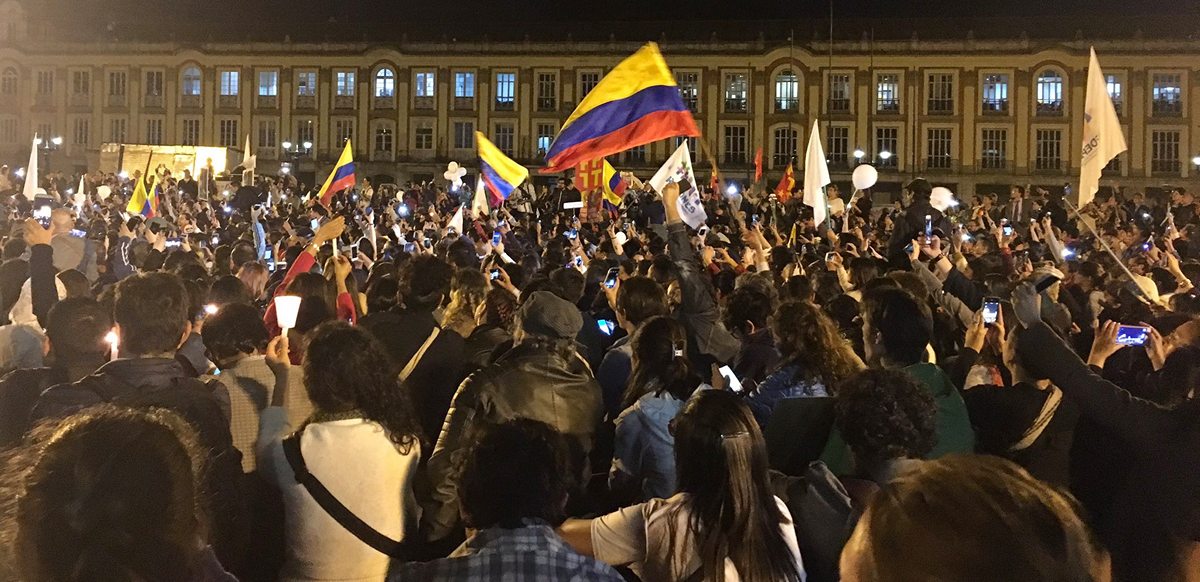
Mass rally for peace fills Plaza Bolivar in Bogotá, October 20,
2016. (D. Gereda)
TML Weekly is providing below an interview with Revolutionary Armed Forces of Colombia-People's Army (FARC-EP) Commander and Secretariat member Iván Márquez, who was also the head of the FARC-EP Peace Delegation in Havana, Cuba. The interview was published by BBC Mundo on October 13, eleven days after a "No" vote prevailed in the plebiscite on the Peace Agreement between FARC-EP and the Colombian government.[1] It is republished from the website of the FARC-EP Peace Delegation.
***
BBC: In the past few weeks, many events have occurred regarding the peace process. Do you feel under high pressure?
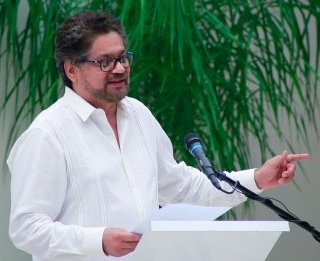 Iván
Márquez:
The truth is that we have
worked in a relaxed manner. There's no problem, we understand the
situation that has arisen. There is a technical draw between the
No and Yes in the plebiscite. The No-vote didn't obtain an
absolute majority, but it has an Achilles heel, and that is that
it was constructed on the basis of lies. The head of the No
campaign himself, Mr. Juan Carlos Vélez, has confessed it,
so this left one of the No-vote sectors in a very weak position,
which is Senator Alvaro Uribe's sector.
Iván
Márquez:
The truth is that we have
worked in a relaxed manner. There's no problem, we understand the
situation that has arisen. There is a technical draw between the
No and Yes in the plebiscite. The No-vote didn't obtain an
absolute majority, but it has an Achilles heel, and that is that
it was constructed on the basis of lies. The head of the No
campaign himself, Mr. Juan Carlos Vélez, has confessed it,
so this left one of the No-vote sectors in a very weak position,
which is Senator Alvaro Uribe's sector.
The No-vote is very diverse. The six million No-votes don't correspond to Uribe [and] Vélez, but Christians are also represented there. And other sectors of society that based on their own reasons and conviction resolved to give a No to the president's performance.
The Havana Final Agreement, signed in Cartagena, is not being judged here, but rather the political action of the President, because plebiscites don't have any legal reach.
BBC: Which do you consider are the non-negotiable points?
IM: We are not talking about non-negotiables. We are pleased to [have] an agreement that contains sufficient elements to start the construction of a stable and lasting peace for Colombians.
Achieving peace and reconciliation is what interests us the most.
BBC: But obviously some sort of negotiation will have to begin in order to include some points of the No campaign. The supporters of this option reject for leaders who have committed war crimes to not go to jail and be able to be elected for public office.
IM: The No campaign was based on lies. There has been an unacceptable manipulation of public opinion which has been demonstrated. That is how media in Colombia captured it and some No promoters recognize it. It's the case of Juan Carlos Vélez.[2]
There will not be impunity. The Special Jurisdiction for Peace does not contemplate the possibility that non-amnesty eligible and unpardonable crimes go unpunished.
There is a sanction, I want to reiterate. But it is a restorative sanction, reparative.
I want to underline this. The Special Jurisdiction for Peace is not just for the FARC, it is for everyone involved in the conflict, including high ranking politicians, the military, entrepreneurs, guerrillas, paramilitaries, police, and directors of mass media that daily promote war.
The Special Jurisdiction for Peace is for everyone involved in the conflict, we must start from that base, because otherwise we can make mistakes in the approaches we have of the Colombian reality.
BBC: But you, Iván Márquez, would you be willing to go to jail a few years?
IM: We will provide truth. Your question is out of place because it does not consult the Special Jurisdiction for Peace. This provides prison for those who don't provide truth. Those, who refuse to go to the Peace Courts, have to pay a punitive sanction and should go to jail.
What is the novelty of this jurisdiction? That truth will be provided in order to heal wounds, that one will take responsibility and if the action is framed within what is non-pardonable, consistent with International Humanitarian Law, there will be no impunity, but rather be treated with a novel process that is restorative.
BBC: But if that's not enough not only for the No campaign but for a majority of Colombians?
IM: Most Colombians want peace. Have you seen similar demonstrations to those that have occurred in the country -- in Bogotá, Medellín, Cali -- to leave behind 52 years of war, which is what some sectors don't want?
BBC: They want peace, it's evident. But as the slogan said: "No, not like that." And there's the problem that you have.
IM: It is what we have agreed, how is it not going to be like that? If the elements that can really lead us to peace exist. Do they want peace? Well, here we have an instrument in our hands which is called [the] Final Agreement. Let's use it.
Let's add to it, yes, as you suggested at the beginning of the interview, some approaches to enrich the Final Agreement and thus have a strong agreement with the support of the whole nation.
For now, what is the No campaign doing and specifically the sector of politicians? They are delaying, delaying the process to take it to a crossroads, to a situation where the process ends. And Colombia does not want that.
BBC: How are the troops right now? Discouraged?
IM: No, the mood of the troops -- and I'll respond paraphrasing the poet Pablo Neruda: "the spirit and morale is so high that it touches the invisible chest of the sky."
People are on the lookout, yes, waiting to know the developments that they know we are trying to realize both in Bogotá and Havana.
We are working hard to seek legal and political formulas, because we need to listen to the No and Yes [voters], and we will also listen to the abstainers -- over 60 per cent who abstained from voting in Colombia.
It's fair for us to listen but also [remark] on one thing: that we held thematic forums in which most sectors participated. We received those opinions in Havana and we reflected them in the agreement.
In that aspect, we feel calm and satisfied because we managed to take the thought and vision that the Colombian social and political movement has into the agreements we signed.
BBC: Does the guerrilla feel in a limbo right now?
IM: This situation of uncertainty needs to be quickly resolved. That is why we reaffirm that the delay that one of the No sectors intends is to finish the peace process, but Colombians are not willing to do that. The country has clearly demonstrated this through its massive demonstrations across the national territory.
BBC: Do you [the FARC] fear defections?
IM: Not really. That fear does not exist in the FARC leadership. We have been clear and precise, and I say so especially after [holding] the 10th Conference of the FARC, where the peace delegation of the FARC in Havana received the unanimous endorsement of the conducted policy deployed in the peace talks.
BBC: Under the current conditions, how much longer can you [the FARC] continue without having a determined final date?
IM: What you mention is correct, and keep in mind that we are not charging taxes to any company at this time. We are making use of a war economy, of an amount of resources that we still have in order to maintain an army. That's not easy and it requires many, many economic resources.
We have many items, such as food, sustenance, provision of a guerrilla, health, transport. It is an army and it demands resources.
BBC: You earlier said "we have no money." In fact, the No campaign used that line against you. Then, the day before voting, you said that you would pay compensation to the victims.
IM: There was a statement of the FARC in reference to the existence of a war economy. It is obvious that the FARC has to live on something. We need to cultivate the land. That may be [considered] a good.
We also have assets, like cattle, where we get milk, meat and cheese that the guerrillas eat. And some blocks may have some savings, and that's what we referred to. They are funds that go into what we call war economy. So that's why we have to speed this up [peace process], because these can run out. It's not true that the FARC are a rich organization like these malicious sectors proclaim.
BBC: Is it an option for you to go back to war?
IM: We would not desire to return to war. Colombia deserves no more wars. I remember the words of the Comandante Alfonso Cano at the end of the [unsuccessful] peace talks with the Gaviria administration [early '90s] in Tlaxcala, Mexico, when he said with sadness: "See you 10,000 dead later."
Colombia [cannot] withstand any more victimization; it needs to make better efforts to achieve reconciliation, peace.
And as I'm telling you, in the final agreement is the key, is the formula, is the roadmap to peace, with dignity, which is what we want. With extensive democracy, as broad as possible, with sovereignty.
BBC: The way you speak, it sounds as if the peace process is not in crisis, but to the rest of the world it seems like it is...
IM: We are optimistic about the crisis. We are not discouraged by the problems. We have faced the most serious ones in all of this history of resistance and this is not going to discourage us.
We are sure that there are political and legal arguments that will allow this peace process to move forward very soon.
BBC: What's the next step for you?
IM: We will meet again with the government in the next days. Today [October 12] we have a meeting to agree on the terms of the protocol on definitive cease of fire and of hostilities.
We are thinking about the possibility of regrouping our force at some places, so we need to agree on the content of those protocols in order to ask the United Nations for its tripartite mission and its monitoring and verification mechanism to begin acting to preserve the absence of armed confrontation that Colombia experiences today.
We have to protect this sort of armistice that we currently have.
BBC: During these years of negotiations, it seemed like it was ultimately a process between the government of Juan Manuel Santos and the FARC, it seems that the former president Uribe has as much to say as these two actors.
IM: I would not like to talk about Mr. Uribe or his positions. Those are his convictions, we have ours. We think that Colombia doesn't deserve war.
Uribe had eight years to try to militarily destroy the FARC and could not do so. If he could not win the war, he should allow Colombians to make peace. That's what we ask.
BBC: You met with the BBC a year ago or so. In a year from now, will we see each other here again?
IM: We hope that this situation gets resolved soon and we are working in that direction. The discussion cannot be eternal because we have discussed for over five years now.
We Colombians are special. Colombia is a great Macondo, the Macondo of García Márquez where so many improbable things happen. And it's implausible for people to rule against the action of a president who wants peace for Colombia.
TML Notes
1. See "Significance of Plebiscite Results," Margaret Villamizar, TML Weekly, October 8, 2016 - No. 39.
2. "Voter
Manipulation
Exposed,"
TML
Weekly, October 8, 2016 - No. 39.
(Translated by www.farc-epeace.org. Slightly edited for style and grammar by TML.)
Toronto Rally Affirms Demand for Peace
with
Social Justice
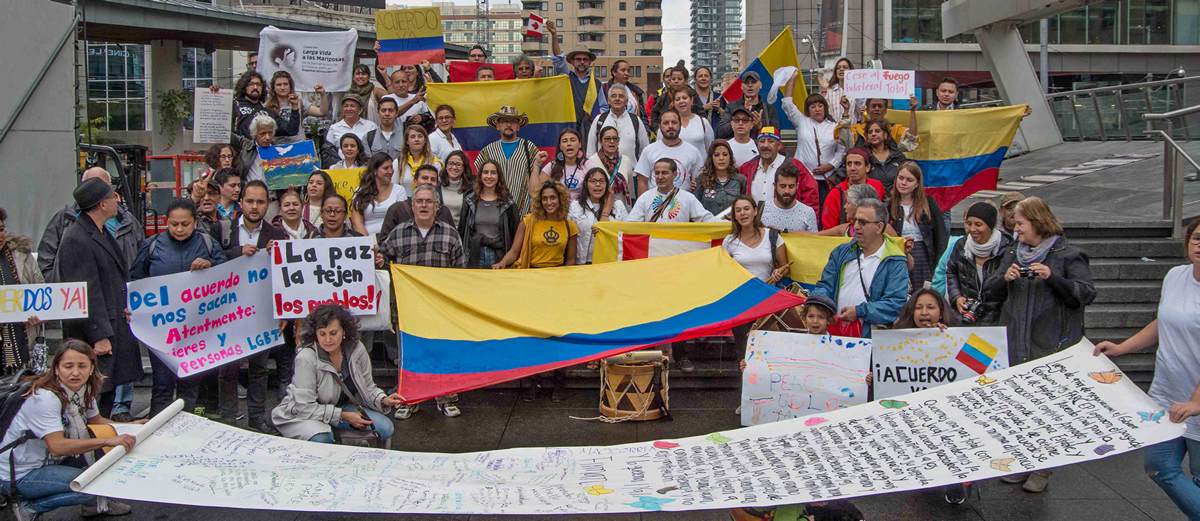
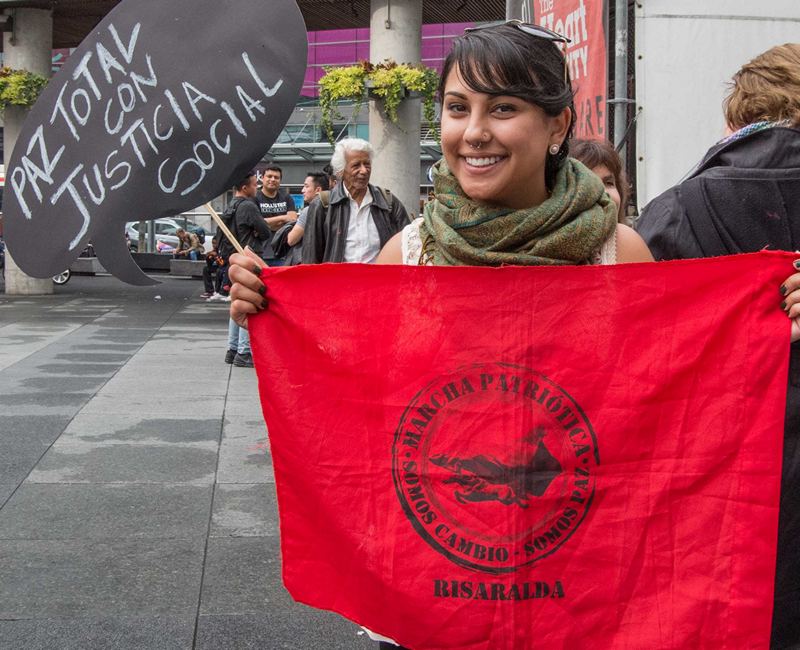 A vigorous rally was held
in downtown Toronto at Dundas Square on October 16 to affirm the
Colombian people's demand for peace with social justice. The action
made clear that despite the victory of the No vote in the October 2
plebiscite on the peace accord between the Colombian government and the
Revolutionary Armed Forces of Colombia-People's Army, implementation of
the accord remains the order of the day. Moreover, the demand for peace
with social justice belongs to the people who seek the social and
political reforms that address the injustices and oppression that are
at the base of the civil war, and to build national unity. The action
brought together many people of Colombian background and others from
the Latin American community, as well as peace and political activists,
including many youth.
A vigorous rally was held
in downtown Toronto at Dundas Square on October 16 to affirm the
Colombian people's demand for peace with social justice. The action
made clear that despite the victory of the No vote in the October 2
plebiscite on the peace accord between the Colombian government and the
Revolutionary Armed Forces of Colombia-People's Army, implementation of
the accord remains the order of the day. Moreover, the demand for peace
with social justice belongs to the people who seek the social and
political reforms that address the injustices and oppression that are
at the base of the civil war, and to build national unity. The action
brought together many people of Colombian background and others from
the Latin American community, as well as peace and political activists,
including many youth.
The loud chants of "Peace in Colombia Now!" along with a group of drummers that led a march around the square drew the attention of passers-by to this important issue.
Organizers of the rally informed that the Colombian people, rather than being demoralized by the October 2 result, have taken to the streets in support of the peace agreement and to urge both sides to the agreement to maintain the conditions for peace until the accord is realized.
A letter to the Colombian government, presented in the form of a long banner to be delivered to the Colombian Consulate, was signed by many at the rally. It stated in part, "We want peace with social justice; we defend the agreement reached in Havana; we stand together with the victims of the armed conflict in their search for truth, justice, reparations and the guarantee of non-repetition; we demand an agreement with a focus on gender and that guarantees the rights of women; we want an integral rural reform; we aspire to an opening to the political system; and we want an agreement that integrates a culture of reconciliation, to live together in tolerance and without stigmatization ... and we want it now!"
One of the participants who spoke to TML at the rally decried the negative role played by reactionary forces in Colombia in the plebiscite, particularly former President of Colombia Alvaro Uribe. She pointed out that the most irrational reactionary propaganda was spread to create hysteria about the peace accord in order to defeat the plebiscite. Besides this, she pointed to the fact that voter turnout was low and the plebiscite is non-binding, and so this supposed rejection of peace is hardly the last word and the people will continue to work to see that the peace agreement is realized.
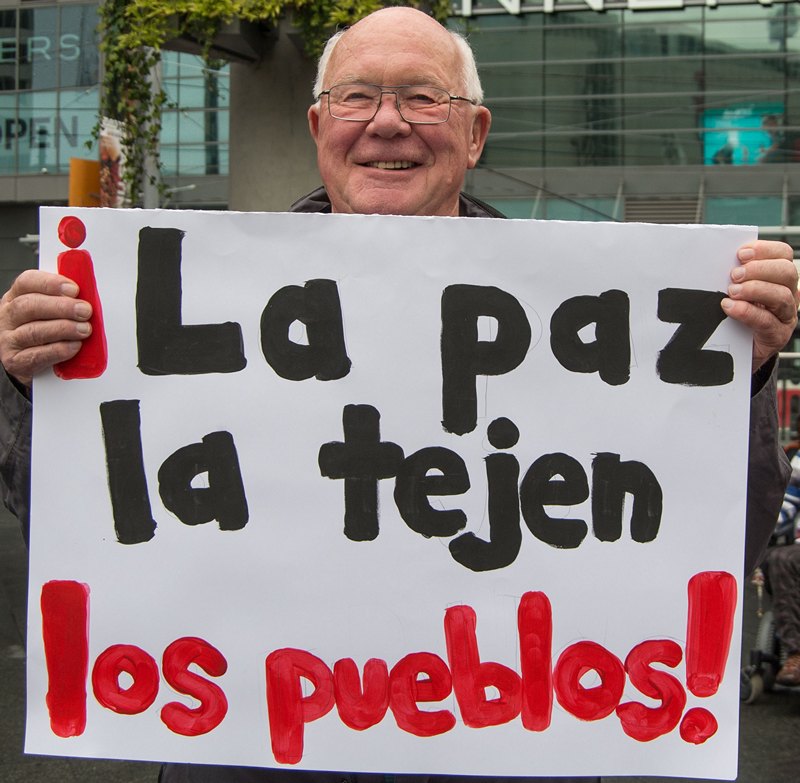
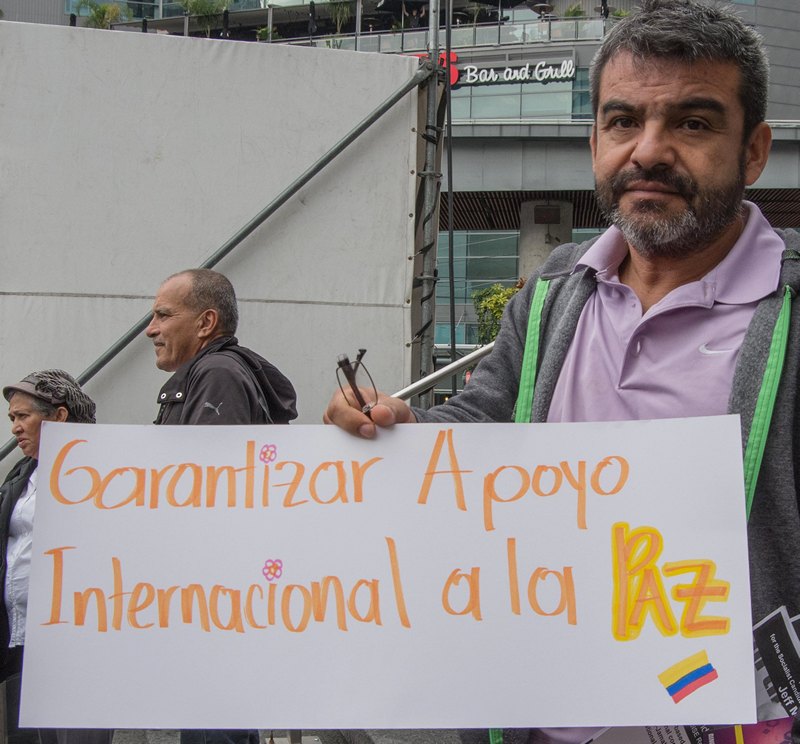
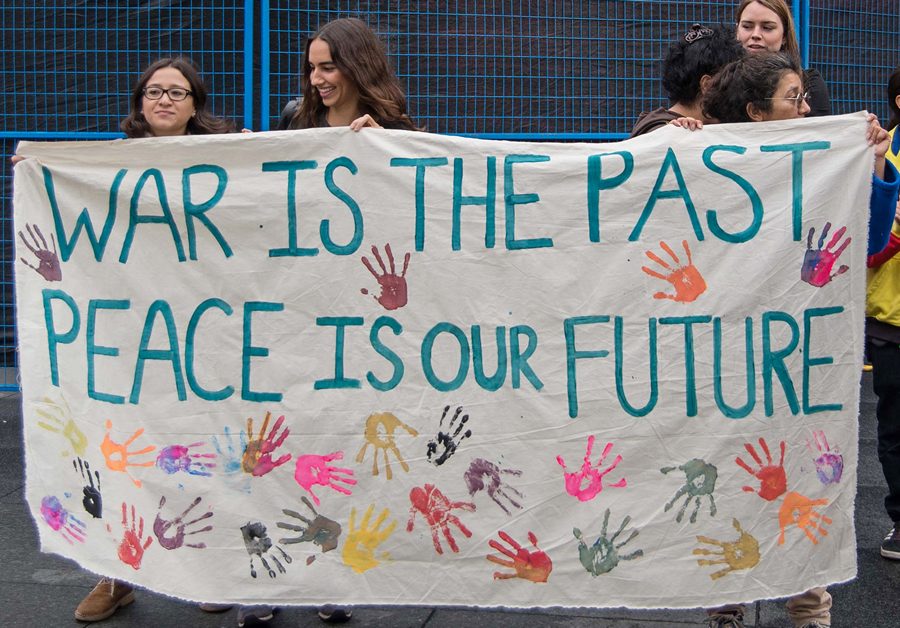
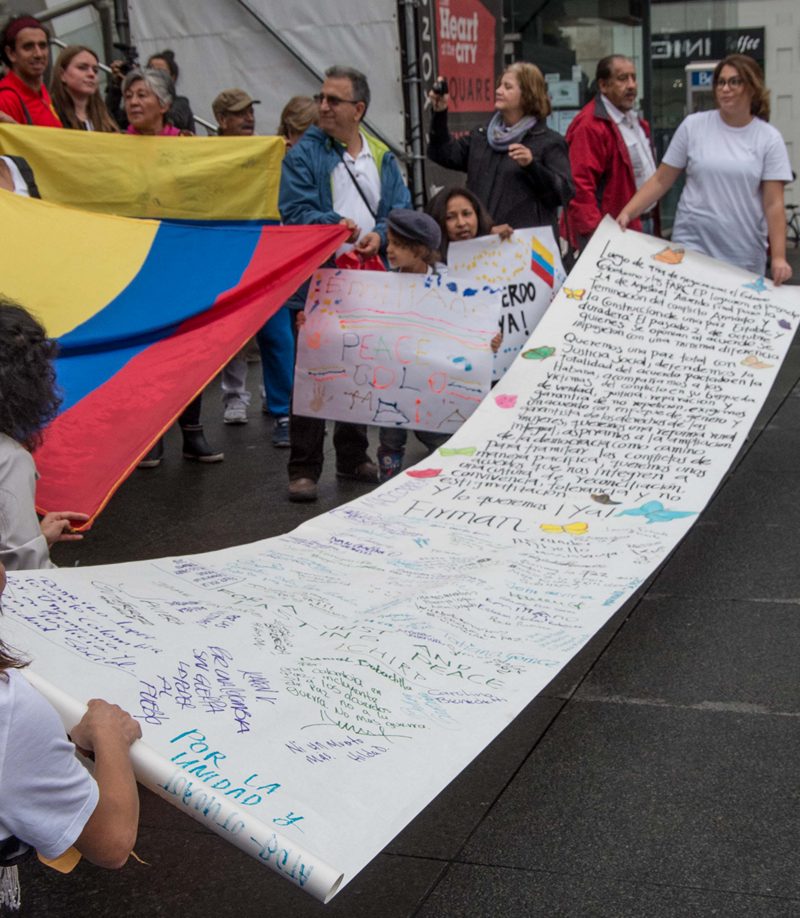
All Out to End U.S. Blockade on Cuba
Worldwide Actions on Eve of Annual UN Vote
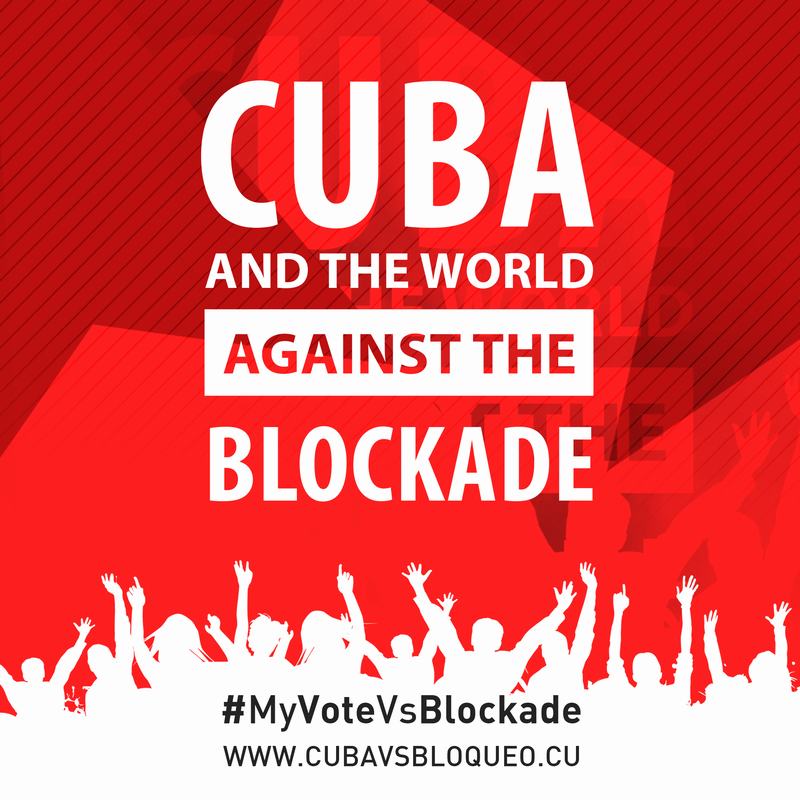
As the annual vote in the UN General Assembly on Cuba's resolution "Need to put an end to the economic, commercial and financial blockade imposed by the United States of America against Cuba" approaches on October 26, across Cuba, in Canada, and around the world, actions are being held to once again send a clear message to the U.S. government to end its illegal blockade of Cuba immediately. Many of these actions took place on October 17, as the 2015 Panama Summit of the Peoples has declared the 17th of each month a day to fight the U.S. blockade. Meanwhile, on social media, tweets with the hashtags #MyVoteVsBlockade #YoVotoVsBloqueo and #CubaVsBloqueo along with selfies of people holding up slogans opposing the blockade continue to spread.
Internationally, governments from all continents have been adding to the positive momentum for another overwhelming vote in Cuba's favour by issuing statements and declarations to demand an immediate end to the blockade. Last year's vote was 191 to two (the U.S. and Israel).
For decades, the unjust blockade has attacked the Cuban people's human rights, including their right to choose their own destiny free from outside interference, in the name of defending human rights. Like the rest of the U.S. policies aimed at undermining Cuba, the blockade has failed to deter the Cuban people from their conviction in their principles that created their human-centred society and permit them to carry out unprecedented acts of internationalist solidarity. The blockade remains a major outstanding impediment to normalizing relations between the two countries, which the U.S. has committed to do.
On October 14, U.S. President Barack Obama issued a directive to consolidate the changes being made to the U.S. policy on Cuba, and to make the new policy irreversible. In a press release, the diplomatic mission described the directive as positive and significant, but qualified its assessment, saying that the directive is very limited in its nature and in general, the new measures are more beneficial to the United States than to the Cuban people. It denounced the persistence of the blockade and reiterated the need to end it once and for all.
Cuba
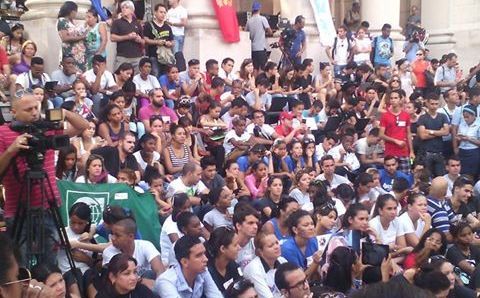
On October 17, youth and students across Cuba held a day of actions entitled, "Swarm Against the Blockade." The University of Havana hosted the main events.
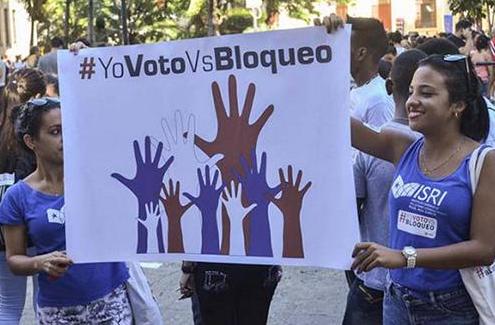
Prizes for the winners of the #YoVotoVsBloqueo Selfies Competition promoted on social networks via @cubavsbloqueo were also awarded. Meanwhile, three new related cell phone apps, developed by students and staff at the University of Computer Sciences, were launched. Cuban television provided live coverage of the events in Havana.
Jennifer Bello, National President of the Cuban University Student Federation (FEU) said the actions "voice our condemnation of such a monstrous policy and demand its total elimination." She spoke to the Cuban News Agency about the program at the University of Havana. Nearly all university facilities were turned into tribunes for the day for the youth to condemn the U.S. policy, in coordination with other Cuban universities. Visual arts were a major activity with students painting colourful messages against the blockade on a huge panel. Sports, audiovisual presentations, book fairs, a camp set up by the children's Pioneer organization, and other events were also part of the program.
The student leader highlighted the conversation with
the
general director for the United States at the Cuban Foreign
Ministry Josefina Vidal. Parts of the exchange with Vidal were
uploaded to social media networks.

"We want our message to multiply and reach millions of youths and honest people around the world, so that they join in, because like in many other battles already waged, unity and solidarity will lead to our victory," said Bello.
A week earlier, on October 12, the 13th Forum of
Organizations of Cuban Civil Society, adopted a statement rejecting the
blockade. The forum included representatives of youth, student,
scientific, cultural and social organizations, as well as religious and
fraternal groups. Sponsored by the Cuban United Nations Association,
the meeting was held in the Raúl Roa García Higher
Institute of International Relations, with the participation of more
than twenty speakers.

Session of 13th Forum of Organizations of Cuban Civil Society, October
12, 2016.
Canada
Solidarity activists and friends of Cuba held pickets
outside
U.S. diplomatic missions on October 17 to call for an end to the
blockade and the immediate return of Guantánamo. In particular,
activists from Ottawa and Gatineau continued their monthly pickets at
the U.S. Embassy, while activists in Vancouver held their monthly
action at the U.S. Consulate. Members of the Table de concertation de
solidarité Québec-Cuba rallied in Montreal that same day.
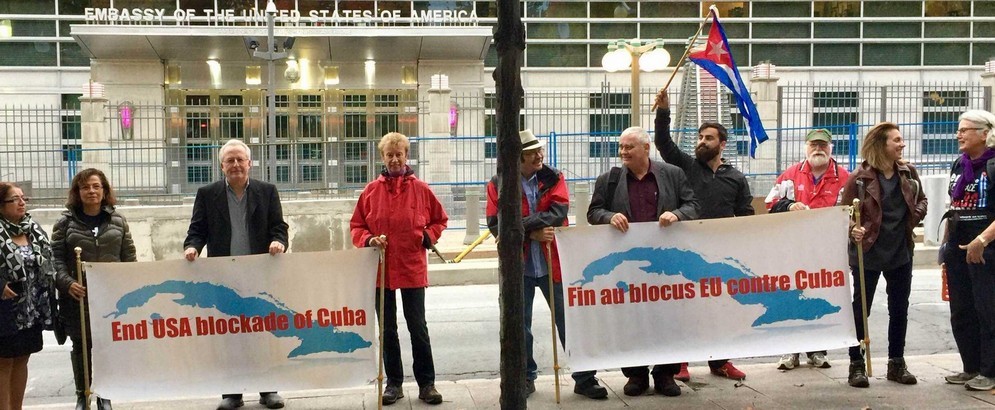
Ottawa
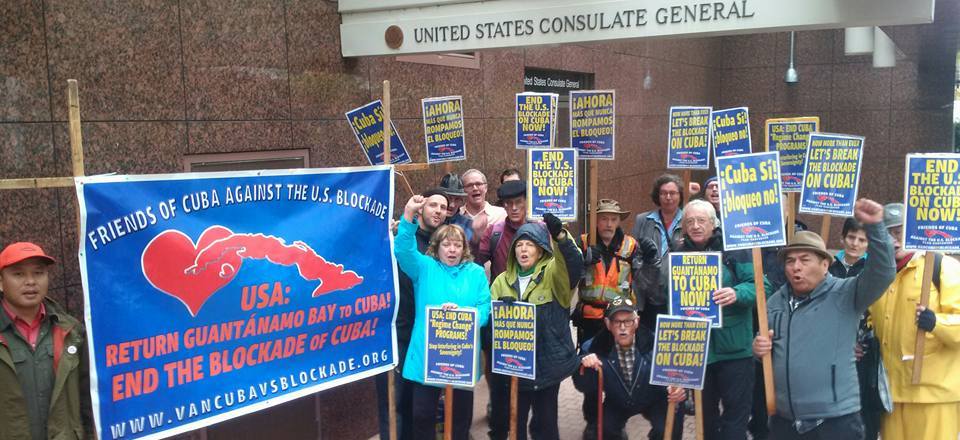
Vancouver

Montreal
(With files from Granma, Cuba vs Bloqueo, Prensa Latina, ACN. Photos: Cuba vs Bloqueo, TML, Granma, Cubadebate)
Website: www.cpcml.ca Email: editor@cpcml.ca
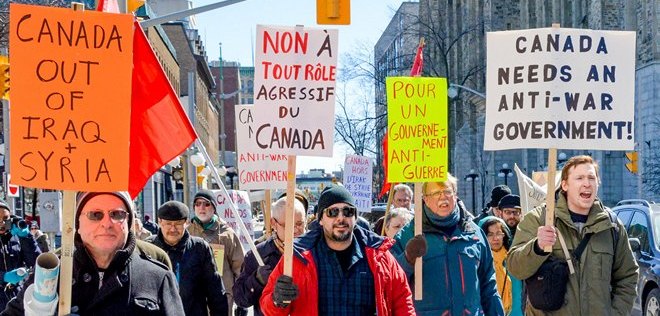
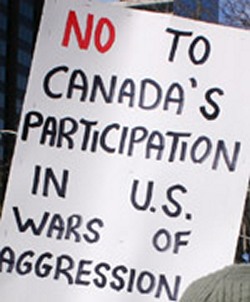
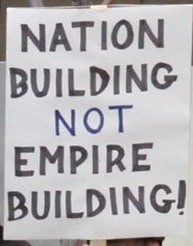
 In the 19th century and into the
20th, Canada's foreign policy was conducted by the Imperial British
Parliament. On behalf of the British Empire, Canadians joined in its
adventure in Crimea and then participated in the Second Boer War as
well as World War I and the subsequent 14-country invasion of Soviet
Russia to overthrow the proletarian state power. But ever since the end
of World War I and the Treaty
of Versailles when it became responsible for its own foreign
relations, no Canadian government has taken any measures
internationally whatsoever, whether in the Security Council or
through other bodies, which would defend democracy or establish
an international order favourable to the interests of the people.
In fact, following World War II when Canada took on the role of
peacekeeper, it became an advocate of Cold War anti-communism and
counter-revolution against the former Soviet Union and people's
democracies as well as the national liberation movements in Asia,
Africa, Latin America and the Caribbean.
In the 19th century and into the
20th, Canada's foreign policy was conducted by the Imperial British
Parliament. On behalf of the British Empire, Canadians joined in its
adventure in Crimea and then participated in the Second Boer War as
well as World War I and the subsequent 14-country invasion of Soviet
Russia to overthrow the proletarian state power. But ever since the end
of World War I and the Treaty
of Versailles when it became responsible for its own foreign
relations, no Canadian government has taken any measures
internationally whatsoever, whether in the Security Council or
through other bodies, which would defend democracy or establish
an international order favourable to the interests of the people.
In fact, following World War II when Canada took on the role of
peacekeeper, it became an advocate of Cold War anti-communism and
counter-revolution against the former Soviet Union and people's
democracies as well as the national liberation movements in Asia,
Africa, Latin America and the Caribbean.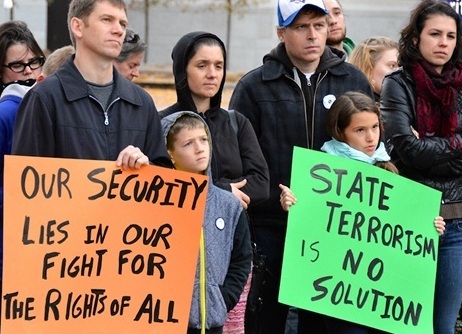 His explanation included a
self-serving account of the fight against terrorism which hides the
state terrorism of the big powers and their intervention in various
countries such as Yugoslavia, Afghanistan, Iraq and Libya to secure
their own hegemony and carry out regime change. "[States] are no longer
engaged in conventional and direct warfare with one another," he said,
adding that we owe this "absence of direct war between states" to
"military and diplomatic efforts toward peace."
His explanation included a
self-serving account of the fight against terrorism which hides the
state terrorism of the big powers and their intervention in various
countries such as Yugoslavia, Afghanistan, Iraq and Libya to secure
their own hegemony and carry out regime change. "[States] are no longer
engaged in conventional and direct warfare with one another," he said,
adding that we owe this "absence of direct war between states" to
"military and diplomatic efforts toward peace."
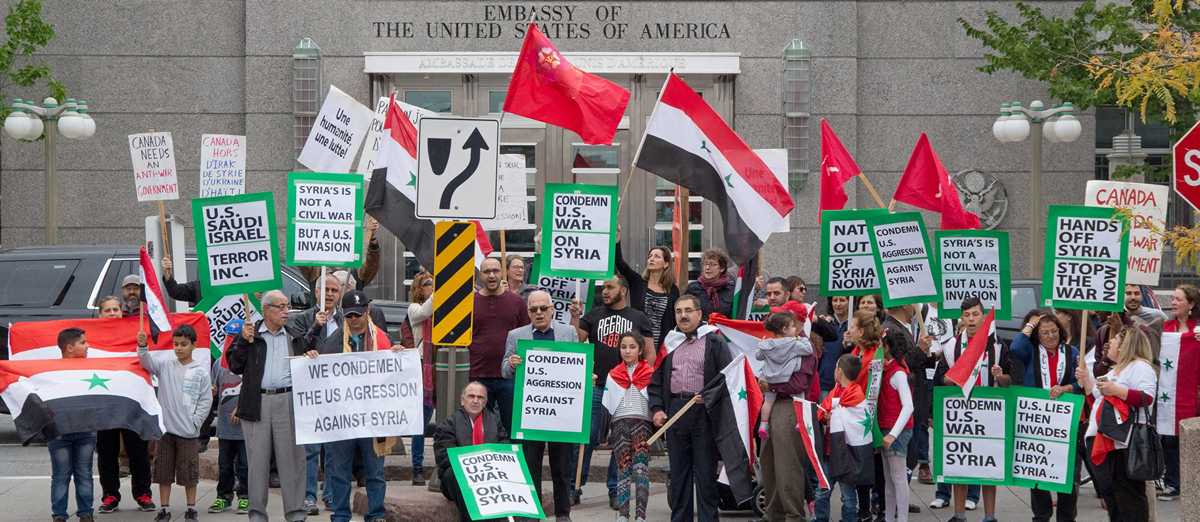
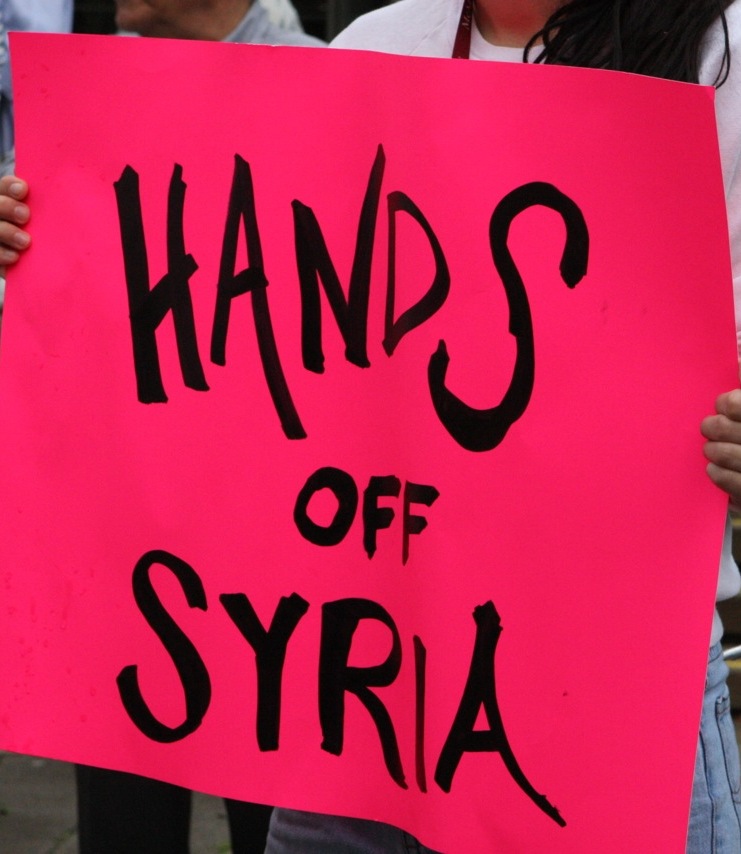 On October 13 the Canadian
Mission
to the United Nations
submitted a request for a special meeting of the UN General
Assembly to "explore concerted action to apply pressure on the
parties of the violence [in Syria]." Canada's deputy permanent
representative at the Canadian Mission to the UN, Michael Grant
told media that Canada's initiative was in response to Russia
vetoing on October 8 a French UN Security Council motion to
institute a "no-fly zone" around the city of Aleppo.
On October 13 the Canadian
Mission
to the United Nations
submitted a request for a special meeting of the UN General
Assembly to "explore concerted action to apply pressure on the
parties of the violence [in Syria]." Canada's deputy permanent
representative at the Canadian Mission to the UN, Michael Grant
told media that Canada's initiative was in response to Russia
vetoing on October 8 a French UN Security Council motion to
institute a "no-fly zone" around the city of Aleppo.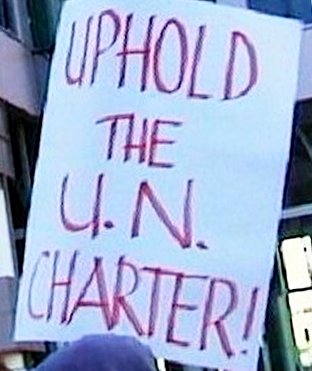 Now the failure of the U.S.
imperialists and their allies to
use the UN Security Council for war aims has again resulted in
Resolution 377 being invoked in the name of peace. Media report
that Canada is discussing at least two concrete proposals for how
to use the UN General Assembly to undermine Syria and its now
five-year struggle against U.S.-backed destabilization and
efforts at regime change. One is the suspension of Syria's voting
rights at the UN or its expulsion. Another is to set up a Special
Prosecutor to launch a spurious case against the Syrian
government for war crimes in an illegitimate court.
Now the failure of the U.S.
imperialists and their allies to
use the UN Security Council for war aims has again resulted in
Resolution 377 being invoked in the name of peace. Media report
that Canada is discussing at least two concrete proposals for how
to use the UN General Assembly to undermine Syria and its now
five-year struggle against U.S.-backed destabilization and
efforts at regime change. One is the suspension of Syria's voting
rights at the UN or its expulsion. Another is to set up a Special
Prosecutor to launch a spurious case against the Syrian
government for war crimes in an illegitimate court.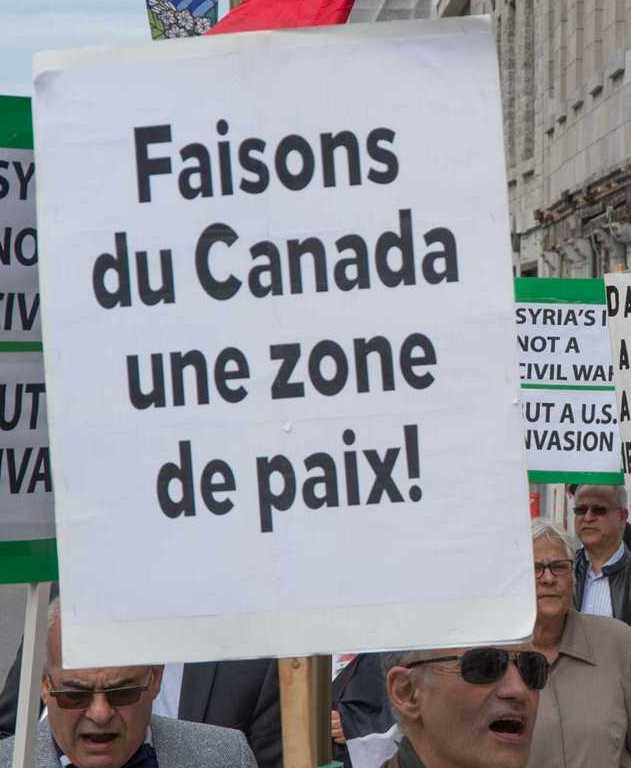
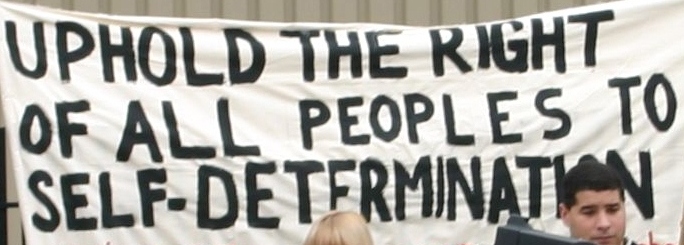
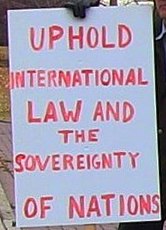 Ban also suggested war
crimes and crimes against humanity are
being committed in Syria and concluded by calling for "all of you
to cooperate and fulfill your collective responsibility to
protect."
Ban also suggested war
crimes and crimes against humanity are
being committed in Syria and concluded by calling for "all of you
to cooperate and fulfill your collective responsibility to
protect." U.S. Ambassador to the UN
Samantha Power made the same
assertion as part of her attempt to demonize the governments of
Russia and Syria. Power referred to Russia and "the Syrian
regime" trampling on the "fundamental principles" the UN was
created to uphold and said that "we" are committed to defending
them.
U.S. Ambassador to the UN
Samantha Power made the same
assertion as part of her attempt to demonize the governments of
Russia and Syria. Power referred to Russia and "the Syrian
regime" trampling on the "fundamental principles" the UN was
created to uphold and said that "we" are committed to defending
them.